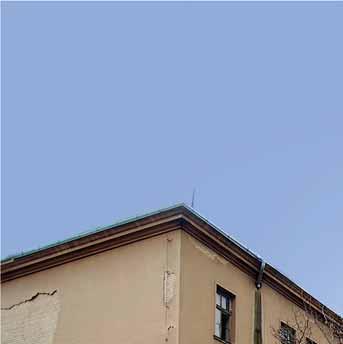

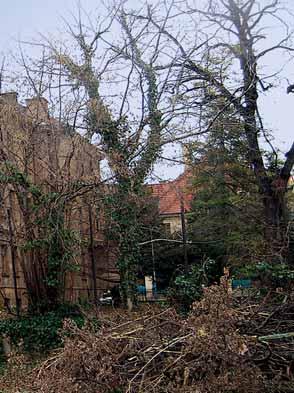
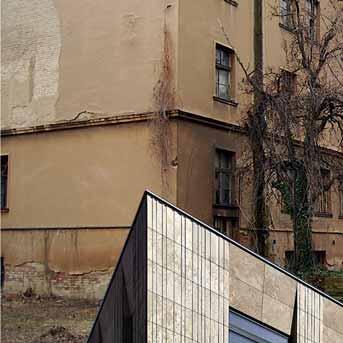
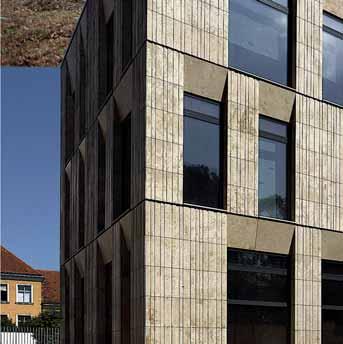
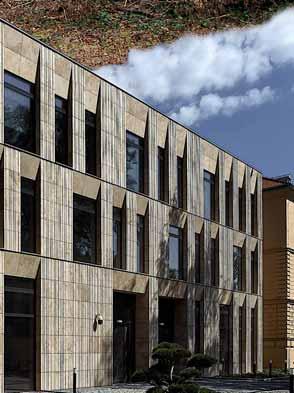
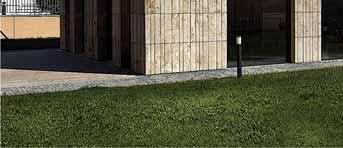




www.czechleaders.com incl. electronic version
WINTER 2022 From
Swan!
Embassy of the Republic of Korea
Ugly Duck to Beautiful
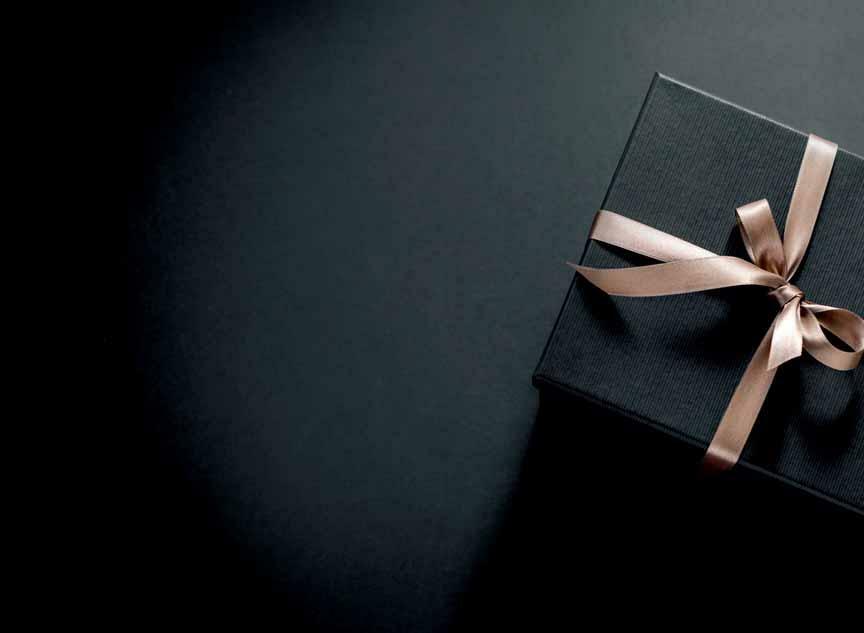
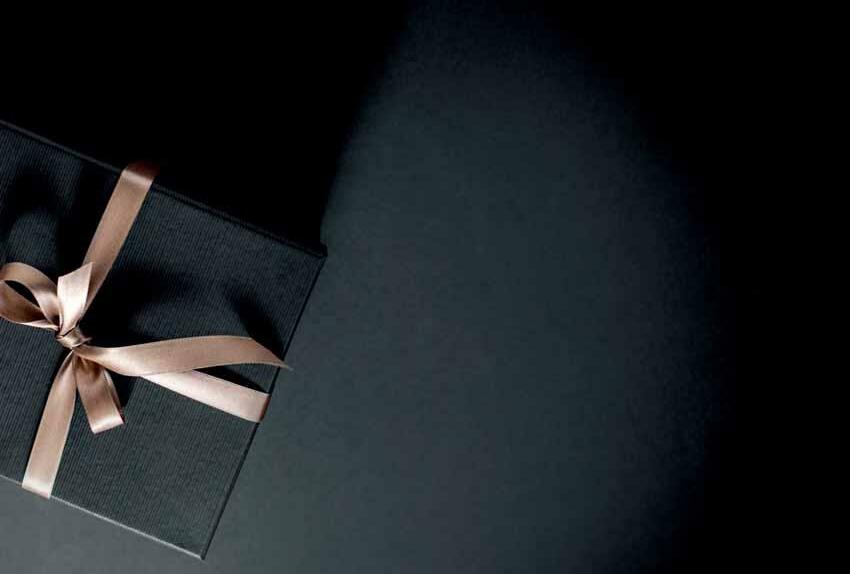

















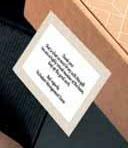

Eva
Benke Aikell Founder
Anderová & Meshulam Zisso Owners & Executive Editors
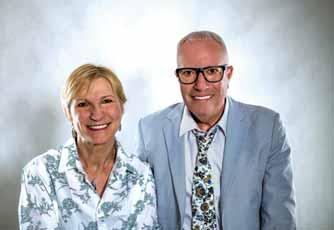
Petra Kubernátová Webmaster
Martina Hošková
Edit & Translation
Šárka Čičková Graphic Design
Publisher
PRIME (1998) s.r.o
Olgy Havlové 2914\52 130 00 Žižkov - Prague 3 IČ: 25682784 DIČ: CZ25682784 e-mail: info@czechleaders.com www.czechleaders.com
Czech & Slovak Leaders
Olgy Havlové 2914\52 130 00 Žižkov - Prague 3 email : info@czechleaders. com www.czechleaders.com
Licence: MK ČR E 13147
No reproduction is permitted in whole or part without the express consent of Czech & Slovak Leaders. The advertiser is responsible for the advertising contents. Opinions expressed in this publication are those of the authors or persons interviewed and do not necessarily reflect the views of the editors or Czech & Slovak Leaders. All editorial material and photos in Czech & Slovak Leaders Magazine is digitally stored and may be republished by Czech & Slovak Leaders either in printed form or in various digital media. All correspondence to Czech & Slovak Leaders Magazine may be published.
Dear readers, friends, and partners,
The end of 2022 is approaching, and all of us are probably looking back to what we have succeeded in, and what we could have done better or differently. So do we, as the new owners and executive editors at the Czech & Slovak Leaders Magazine, as well as our team.
We hope that our efforts have brought about dynamic changes in quality to our magazine, be it in the format or the content, and we hope to create even better issues to come in 2023. We will always be open to your opinions and suggestions, in order to improve and serve you, our loyal reading partner. All of that matters to us.
We hope you liked the numerous interviews we carried out with diplomats, representatives of governmental institutions, politicians, and businessmen. Or simply with other outstanding people from different areas of everyday life and society. With the upcoming festive holidays, one has to think about what 2022 has brought to our lives, and how we have dealt with it. One of these many thoughts was probably expressed best by John Lennon and Yoko Ono‘s song Happy Xmas (War Is Over). You probably know this, as it is a timeless classic.
Quoting their text: So this is Christmas And what have you done Another year over And a new one just begun And so this is Christmas I hope you have fun The near and the dear ones The old and the young And so this is Christmas (ooh) For weak and for strong (ooh) For rich and the poor ones (ooh) The war is so long (ooh) And so happy Christmas (war is over) For black and for white (if you want it) For yellow and red ones (war is over) Let’s stop all the fight (now) A very Merry Christmas And a Happy New Year Let’s hope it’s a good one Without any fear
We are sure it will ring a bell with you. Don‘t you think their lyrics speaks to us now more than ever?
It takes us all to live, to remember, and to change our lives for the better. We can achieve our important mission with your support, by publishing your advertisements with us. So, as the year end approaches, let us wish you all the best for the new one.
WE ARE HERE FOR YOU!
Respectfully and with best wishes, Eva & Meshulam
Owners and Executive Editors eva.anderova@czechleaders.com meshzisso@czechleaders.com
PUBLISHERS’ NOTE
expert eye
5 Expert Eye with Eva Volfová
Let’s act together to create a climate-resilient landscape
28 Expert eye with Miroslav Bobek Welcome to the new DJA reserve in Prague Zoo!
56 Expert eye with Dmitri Babich
Let´s invite natural stone back into our interiors
86 Expert eye with Ivo Nahálka The very best buildings are both functional and beautiful
90 Expert eye with Miroslav Bobek
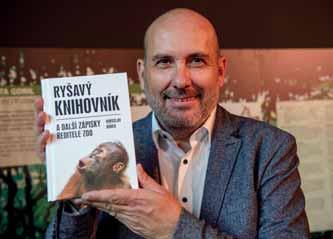
Prague Zoo´s director receives highest state award from Mongolia
interviews
8 Interview with H.E. Mr. Antonios Theocharous, Ambassador of Cyprus After 5 years, it is time for farewell
12 Interview with H.E. Mr. Feng Biao, Ambassador of China Each country has its own historical traditions
20 Interview with H.E. Mrs. Antoaneta Barta, Ambassador of Romania Romania and Czechia are traditional partners that need to rediscover each other
32 Interview with Cornel and Kristina Boda, owners of Cobra There’s definitely a lot to look forward to!
34 Interview with H.E. Ms. Bettina Kirnbauer, Ambassador of Austria The relations between Czechia and Austria are the best they’ve ever been
36 Interview with H.E. Mr. Abdulla Abdullatif Abdulla, Ambassador of the Kingdom of Bahrain Being an ambassador means being the face of your country abroad
40 Interview with Filip Křesťan, Production and Technical Director of Metrostav Metrostav operates in more than 15 European countries 44 Interview with H.E. Ms. Gunta Pastore, Ambassador of Latvia It is extremely easy to work with Czech partners
EU presidency
19 EU meeting 51 The war started in Crimea, it will also end in Crimea! 78 Speaker of the Chamber of Deputies in the Sejm 84 Speaker of the House: EU needs Moldova and vice versa
events
16 Embassy of the Republic of Korea house – from an ugly duck to a beautiful swan 25 National Day of Romania 52 Viva Mexico, viva Republica Checa 66 National Day of Algeria 74 National Day of Turkey
48 Interview with H.E. Mrs. Phasporn Sangasubana, Ambassador of Thailand When you find a like-minded friend, you want your relationship to grow 60 Interview with H.E. Mr. Ilirian Kuka, Ambassador of Albania The Czech EU presidency always marks a major event for Albania 63 Interview with H.E. Mr. Pasi Tuominen, Ambassador of Finland The business is changing 69 Interview with H.E. Mr. Andreas Künne, Ambassador of Germany We are neighbours cooperating in the heart of Europe 72 Interview with H.E. Mr. Alberto Moreno Humet, Ambassador of Spain Spain is a country of great diversity 80 Interview with Tomáš Podzimek, Magician Magic is art, and it is hard to judge yourself
4
CONTENTS
Let’s act together to create a CLIMATE-RESILIENT LANDSCAPE
 Text: Eva Volfová; Photo: Archive
Text: Eva Volfová; Photo: Archive
EXPERT EYE WITH EVA VOLFOVÁ
Why we need to protect biodiversity
Healthy ecosystems provide food and food security, clean water, carbon sinks, and protection against natural disasters caused by climate change. They are essential for our long-term survival, wellbeing, prosperity, and security, as they are the basis for Europe’s resilience. But despite EU and international efforts, biodiversity loss and the degradation of ecosystems continue at an alarming rate, harming people, the economy, and the climate. 1)
During the Czech presidency of the EU Council, we started negotiations on the new European Nature Restoration Law. It admits that nature has been degraded to a large extent, and that we need to restore it in order to survive. Climate and biodiversity crises are two sides of the same coin, which is the “unsustainability” of our civilization’s way of life.
Political will and funding can be mobilised
Tackling biodiversity losses, protecting our nature, and doing everything possible to maintain sustainability are one of our most important common goals. Biodiversity is the absolute basis of life. Protecting and restoring biodiversity is the only way to preserve the quality and continuity of human life on Earth. The COVID-19 pandemic has once again shown us the fundamental importance of ecosystems and biodiversity for our health, and for our economic and social stability.
The rapid and massive response to the COVID-19 pandemic demonstrated that enormous political will and funding can be mobilized when humans perceive an existential threat. It is imperative that the climate and biodiversity crises be communicated as similar threats as well.2)
Protecting biodiversity is a global challenge, and the next decade will be decisive. Our wilderness is disappearing before our eyes, and more species are being put at risk of extinction than at any other point in human history. In

the last four decades, global wildlife populations fell by 60% as a result of human activities3). Global efforts have largely been insufficient up until now. Climate change is largely negatively affecting biodiversity in all ecosystems, including critical and vulnerable ones, as well as intact and wilderness areas. Nature cannot afford any half-measures or lack of ambition. In this spirit, the EU and Czechia, as the current Presidency of the Council, are committed to doing their utmost to reverse the negative trends.
We must shift from theory to action
For decades it has been known what we need to do. We have had a lot of international conventions, strategies, commitments, and instruments, but for a long time it has been obvious that it is still not enough. In the 30 years of its existence, our law on nature and landscape protection has never been fully implemented. We have settled for half-measures in nature conservation, which have only slowed the decline, but real change is admitting that the negative trends have not been reversed and coming up with a truly viable solution, which will finally reverse decades of exploitation.
It is evident that political attention and will is indeed shifting towards more recognition of nature and climaterelated issues. We need to shift from theory to action. If we are to have any chance at all of halting the decline in biodiversity, mitigating climate crisis, increasing water retention, being more resilient to climate change, etc. then we need large-scale implemented local solutions involving all actors. Conservationists alone cannot “save nature” on their own, despite their best efforts. They can offer experience with sustainable practices, but these cannot be merely applied in protected areas. The concept of sustainable land use, which can go hand in hand with nature conservation, is also appropriate given the current priority of food and energy security.
1) https://environment.ec.europa.eu/publications/nature-restoration-law_en. 2) Prague Manifesto for Biodiversity Conservation – ECCB 2022. 3) https://ec.europa.eu/ environment/biodiversity/business/biodiversity/index_en.htm
6
She studied environmental protection at the Faculty of Science of Charles University in Prague. Currently, she works as a Deputy Minister of the Environment. She worked as an adviser to the deputy for the environment at the Regional Office of the Pilsen Region. She is a forensic expert in the field of nature protection. She was involved in the preparation and implementation of Natura 2000. she did field mapping of habitat types, expert site proposals, management plans, monitoring, appropriate assessments. She is a member of non-governmental organizations: Ametyst, Czech Botanical Society, and Czech Ornithological Society.
Sometimes, we have to just let nature do its job Sometimes, we only have to let nature do its job for transformative regeneration to occur. A good example is the forests of the National Park in Bohemian Switzerland, which was hit by a strong fire this year. A natural phenomenon is taking place there, which will help start the natural regeneration of the area and will allow for the creation of multi-species, resilient forests in place of the
former spruce and pine monocultures. This restoration is already underway there.

As a species, humankind only has a limited amount of time left to effectively use the knowledge we have accumulated to collaborate broadly in order to restore landscapes and ecosystem services so that we can survive on this planet.



7
Mgr Eva Volfová
After 5 YEARS, it is time for farewell
Mr. Antonios Theocharous, Ambassador of Cyprus, has successfully represented his country in Czechia for five years. In his farewell interview, we asked him to share his point of view on the time of his mission here, as well as some other issues. Enjoy the reading… and who knows, it might even inspire you to learn more about the Ambassador´s homeland, and spend your next holiday in Cyprus - a warm, friendly island country in the Mediterranean Sea.
Can you please introduce yourself a bit to our readers?
I was born in 1971 in Limassol, where I lived until 1989, attending elementary and high school. Those carefree school years were interrupted by serving in the Cypriot army, due to the consequences of the Turkish invasion in 1974 and the ongoing occupation.
This was followed by university studies in the UK, in the field of economics. At the end of my studies, and after passing all the stages of both the written and oral exams, I joined the diplomatic service of the Republic of Cyprus. I wanted to serve my country by communicating the Cyprus issue, and discovering different possibilities for strengthening the relations of Cyprus with other countries. This was only possible with hard work and effort.
You have been in the Czech Republic for five years instead of the usual four. How did that happen?
I arrived in Prague in September 2017 with the instructions from Nicosia to re-operate our embassy,

8
Text: Martina Hošková and M. Zisso; Photo: Archive
WITH H.E. MR. ANTONIOS THEOCHAROUS, AMBASSADOR OF
INTERVIEW
CYPRUS

9
INTERVIEW WITH H.E. MR. ANTONIOS THEOCHAROUS, AMBASSADOR OF CYPRUS
which had suspended its operations due to the financial crisis in 2013. Thus, the first two years were mostly spent on the administrative and organizational issues related to the operation of the embassy. At the same time, the embassy was promoting bilateral cooperation with the Czech Republic, as well as serving the public – especially Cypriot citizens. A turning point that will not be forgotten was the pandemic, and, as it was throughout the whole world, its negative consequences on the economy and society in general. This was also the reason why I have stayed in the Czech Republic one year longer than expected.

How many countries have you served in before coming to Prague?
So far, I have been based in five countries: Austria (with parallel accreditation to Slovakia, Croatia, Slovenia, Liechtenstein, OSCE, and the UN Office in Vienna), Greece (Consul General in Thessaloniki), Germany, Hungary (with parallel accreditation to Bosnia and Herzegovina) and currently the last mission has been to your country, the Czech Republic.
As I already mentioned before, the period of the COVID-19 pandemic has undoubtedly had the biggest impact on my duties in Czechia. Since the airports and means of transport were closed, several Cypriots were stranded in the Czech Republic and the embassy had to intervene to help them return to Cyprus.
Does the role of ambassador affect your lifestyle?
Of course, being an ambassador has both positive and negative effects to one’s lifestyle. It’s a matter of dealing with them in good spirits and always being optimistic. Living far away from your hometown and family is not easy, but it is also challenging in terms of meeting new people and making new friends. The little free time I have I mostly devote to my loved ones and to relaxing by watching TV - Greek comedies and series.
Cyprus is an attractive holiday destination for Czech people. How do you promote your country?
Cyprus organizes promotional events in collaboration with local agencies. For example, in the summer the Botanical Garden of Prague presented an exhibition with plants from Cyprus, as well as the book „Botanical Journeys through Cyprus“. The embassy also hosted an event and presented Cypriot flavors by offering Cypriot halloumi cheese and the alcoholic beverages koumandaria (sweet wine) and zivania (shots). That is what the person visiting Cyprus will see, smell, and taste. In previous years, the Embassy of Cyprus took part in
the Festival of Embassies, where people could taste traditional food of different countries. Furthermore, we distribute quite a lot of promotional material on every occasion, like the European Day, Festival in Brno etc.
The EU Council presidency of the Czech Republic started in July. What are your expectations in this regard?
Cyprus expects the Czech Republic to lead the effort to restore peace in Ukraine, remove Russian occupation troops, and show respect for Ukraine‘s sovereignty and territorial integrity. Having said that, we expect that the Czech Republic will do exactly the same and without discrimination in the case of Cyprus, which has also been under occupation since 1974.
This interview is a farewell after your five years in Prague. Can you make a wish for our countries on this occasion?
Let me say that our bilateral relations within the framework of the EU are at a very good level, with the prospect of further improvement. I wish both of our countries freedom, peace, security, and prosperity.
10
INTERVIEW WITH H.E. MR. ANTONIOS THEOCHAROUS, AMBASSADOR OF CYPRUS
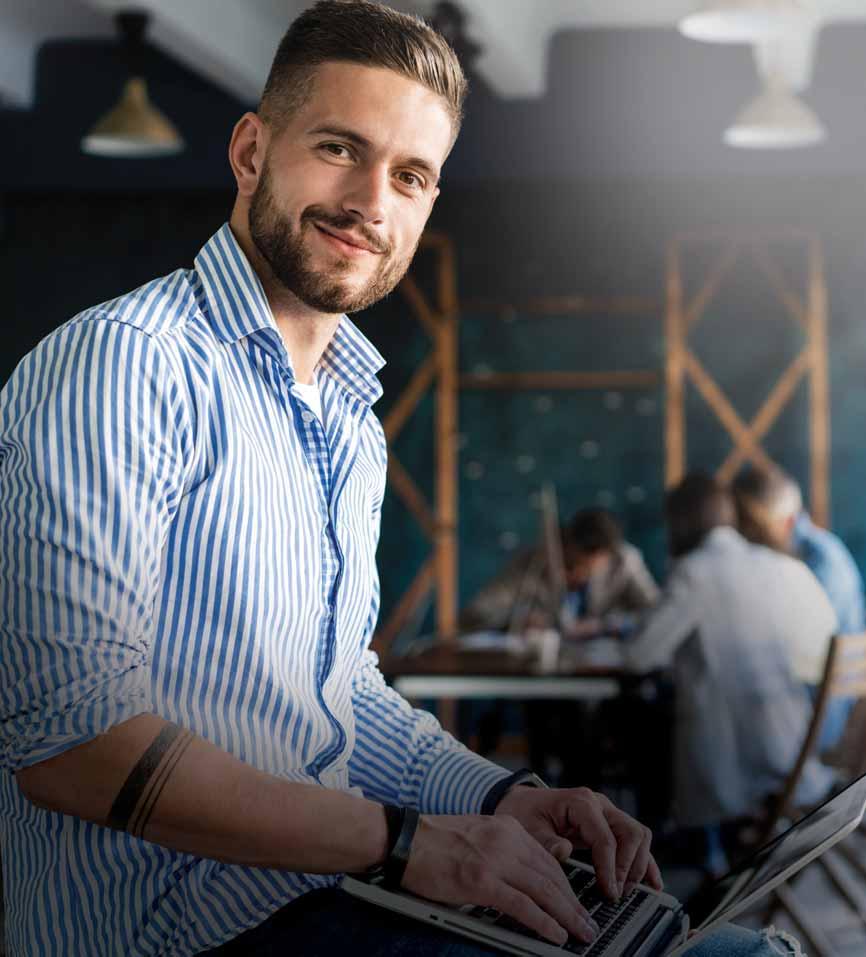
AND THE RIGHT MBA. Entrepreneurship | Finance Management | Marketing Global Business Services WWW.UNYP.CZ A GOOD LEADER NEEDS CONFIDENCE UNYP MBA ADVERTISEMENT
EACH COUNTRY has its own historical traditions
 INTERVIEW WITH H.E. MR. FENG BIAO, A MBASSADOR OF CHINA
Text: Martina Hošková and M. Zisso; Photo: Archive
INTERVIEW WITH H.E. MR. FENG BIAO, A MBASSADOR OF CHINA
Text: Martina Hošková and M. Zisso; Photo: Archive
“China has a history that includes a million years of humanity, 10,000 years of culture, and more than 5,000 years of civilization”, proudly says the new Chinese Ambassador in the Czech Republic, Mr. Feng Biao, and continues: “It is important to seek common ground while shelving differences, and to achieve harmony without uniformity.” How is the new Ambassador feeling in Czechia? What does he say about the relationship between the two countries? And how does he see the relationship between his country and the world?
Mr. Ambassador, you arrived in the Czech Republic on 14th October this year. Before, you worked in Chinese embassies in Syria, Egypt, and Sudan. What were your first impressions of our country? Thank you for asking this question. It is a great honour for me to be the new Chinese Ambassador to this beautiful country. Actually, I feel at home here. First of all, my hometown is in the south of the Yangtze River of China, which has a similar climate and environment to that of the Czech Republic, with beautiful scenery, frequent rain, and moist air.
Secondly, both our countries have time-honoured cultural traditions and good aspirations for the prosperity and development of human civilization. Our two countries have rich cultural resources for exchange, and can work together to promote dialogue and mutual learning among civilizations.
Thirdly, China and the Czech Republic enjoy a traditional friendship. Czechoslovakia was one of the first countries to establish diplomatic relations with the new China in 1949. In the early days of the People’s Republic of China, the Czech Republic donated agricultural machinery and equipment to China. During the fight against the COVID-19 pandemic, China and the Czech Republic supported each other, and China helped provide a large amount of pandemic-prevention supplies to the Czech Republic. China and the Czech Republic have helped each other through difficulties in different historical periods, demonstrating the friendship between our two countries and two peoples. I hope that in the new era the two countries will continue to strengthen their friendship and cooperation, for the well-being of both countries and peoples.
What do you consider the most difficult part of being an ambassador?
As the title itself suggests, an ambassador is a representative from one country to the other in order to promote friendship and ties between the two countries and peoples. The most difficult thing about being an ambassador is having the way of thinking needed to deal with problems and resolve conflicts. Each and every country and nation has its own historical traditions, cultural heritage, basic national conditions, and ways of thinking. It is important to seek common ground while shelving differences, and to achieve harmony without uniformity in order to bring people closer to each other. During my tenure, I will do my best to consolidate mutual political trust, expand economic cooperation and trade, and strengthen people-to-people exchanges between China and the Czech Republic. I will make unremitting efforts to promote the steady and longterm development of the China-Czechia strategic partnership, improve the well-being of our people, achieve common development, and write a new chapter of China-Czechia friendship.
China is a large country that has a lot to offer to travellers. Can you introduce the natural and cultural heritage of your motherland, please? Thank you for your interest in my motherland. As one of the countries with the longest history in the world, China has a history that includes a million years of humanity, 10,000 years of culture, and more than 5,000 years of civilization, and the Chinese civilization is the only civilization in human history that has lasted for over 5,000 years without interruption. For a long time, the Chinese civilization has exchanged knowledge with other civilizations and learned from each other, contributing to the world with profound systems of thought, rich achievements in science, technology,
13
INTERVIEW WITH H.E. MR. FENG BIAO, A MBASSADOR OF CHINA
culture and art, and unique institutional creations. As a matter of fact, the Chinese civilization has profoundly affected the progress of world civilization. Today, China has a rich and profound cultural heritage, with 518 items in the first batch of the national list of intangible cultural heritage, and 42 items recognized as UNESCO intangible cultural heritage. Chinese literature, calligraphy, music, drama, tea ceremonies, porcelain, etc. have a unique sense of beauty, and reflect the peaceful, optimistic, and open traits of the Chinese people.
As you said, China is a vast country, and covers an area of over 9.6 million square kilometres. It has a beautiful landscape, with 318 national 5A-rated scenic spots and 45 national tourist resorts. By July 2021, the total number of China‘s world heritage sites had reached 56, among which 38 are cultural sites, 14 are natural sites, and 4 are mixed sites, including the Great Wall and the Forbidden City of Beijing. Different regions in China have various scenes and customs, and China’s regional cultures are diverse and colourful.
Moreover, China has enjoyed a rich food culture since ancient times, which emphasizes the seasonality, appearance, meaning and nutrition of food. The renowned Eight Cuisines of China are Anhui, Guangdong, Fujian, Hunan, Jiangsu, Shandong, Sichuan, and Zhejiang. These cuisines have distinctive culinary styles, and I believe our Czech friends will find their favourites among them.
With this interview, I would like to extend a warm welcome to our Czech friends to visit China, and experience a real and wonderful China.
Thank you for this really nice overview of the enjoyable features that are part of the colourful country of China. Now, can you describe the current status of Czech-Chinese relations?
This is an important question. The Czech Republic was one of the first countries to recognize the People‘s Republic of China. This year marks the 73rd anniversary of the establishment of diplomatic relations, and the 6th anniversary of the establishment of a strategic partnership between China and the Czech Republic. History shows that friendly cooperation has always been the mainstream of China-Czechia relations, and mutual benefit and win-win results are the foundation of bilateral cooperation. In particular, since the Czech Republic joined the Cooperation between China and Central and Eastern European Countries (the China-CEEC Cooperation) in 2012, the China-Czechia practical cooperation has continued to reach new levels.
According to the Czech Statistical Office, the bilateral trade volume between China and the Czech Republic increased by 120% from US$17.4 billion in 2012 to US$38.3 billion in 2021. Currently, the Czech Republic is China‘s second-largest trading partner in Central and Eastern Europe, while China is the Czech Republic‘s largest trading partner outside the EU. In addition, according to the statistics of the Chinese Embassy in the Czech Republic, Chinese investment in the Czech Republic increased from less than US$300 million in 2013 to US$1.7 billion in 2021. There are now more than 50 Chinese enterprises in the Czech Republic, covering traditional manufacturing sectors such as automobiles, machinery,

14
home appliances, and chemicals, as well as emerging sectors such as information technology, new energy, and e-commerce.
China attaches great importance to the development of its relations with the Czech Republic, regards the Czech Republic as an important cooperative partner, and firmly believes that maintaining and growing a sound relationship between China and the Czech Republic best serves the common interests of the two countries and two peoples. For some time now, a small group of people in the Czech Republic, out of ideological prejudice and other reasons, have been interfering in China‘s internal affairs, undermining China‘s interests and causing adverse impacts. It should be pointed out that this group of people are incapable of preventing the people of the two countries from further developing friendly relations, let alone blocking China‘s development and progress. China stands ready to work with the Czech side, on the basis of the principles of mutual respect, equal treatment, and mutual benefits, to strengthen friendly cooperation in various fields, promote the sustained, sound, and steady development of bilateral relations, and create more benefits for the people of both countries.
The waiting time for a new electric car in Czechia has now exceeded one year. Since China is a leader in the field of new energy vehicles, I would like to ask when we would be able to find them, and especially the BYD SUV atto 3, on sale here. This is a very interesting question. Thank you. In recent years, China has been making great efforts in developing a new energy vehicle (NEV) industry, and has more than 70 NEV brands. Now, there are around 600,000 NEV-related enterprises operating in China. In 2021, the output of new energy vehicles in China reached 3.545 million units, with a year-on-year growth of 159.5%. The sales volume was 3.521 million with a year-on-year growth of 157.6%, ranking the first in the world for seven consecutive years. The Chinese NEV industry strives to innovate technology, reduce costs, optimize services, and improve their brand image, and is rewarded with an increasing reputation in the global markets. In 2021, China exported 310,000 new energy vehicles with a year-on-year increase of nearly three times, accounting for one third of the world’s export volume and making China the largest NEV exporter in the world. From 2021 to 2026, China’s production and sale of new energy vehicles are projected to grow at an average annual rate of over 40%.
At present, there are several Chinese NEV brands selling in the Czech Republic. SAIC MG is one of them, and the sales volume of SAIC MG has been nearly 300 units in 2022. Some other brands are actively exploring the Czech market at the moment. I hope Czech customers could have the opportunity to buy the BYD atto 3 and other models from local dealers in the near future, and we
look forward to more and more trade and investment cooperation between China and the Czech Republic in the field of new energy vehicles.
This interview is given on the occasion of the National Day of China. What wishes do you have for your motherland, and for the Czech Republic? In the 73 years since the founding of the People‘s Republic of China on 1st October, 1949, and especially in the over 40 years of reform and opening up, China has made impressive achievements in development, and both its comprehensive national power and the living standard of the Chinese people have improved significantly. We have completed the historical task of eradicating absolute poverty and finishing building a moderately prosperous society in all respects, and have embarked on a new journey toward building a modern socialist country in all respects. In 2021, China‘s GDP reached 114 trillion yuan (approximately CZK 376 trillion) and accounted for 18.5% of the world economy. China has firmly remained the world’s second-largest economy. It has entered the ranking of the most innovative countries of the world, with the second highest nationwide R&D spending and the largest cohort of R&D personnel in the world, and has achieved major successes on multiple fronts, including manned spaceflight and Moon and Mars exploration. China has built the world‘s largest education, social security, and healthcare systems, and is recognized as one of the safest countries. The average life expectancy of the Chinese people has risen to 78.2 years.
Just as China cannot develop in isolation from the world, the world needs China for its development. In 2021, the total value of China‘s trade in goods and services grew to US$6.9 trillion, the stock of its investment in foreign countries exceeded US$2.6 trillion, and the cumulative foreign direct investment in China exceeded US$2.6 trillion. From 2017 to 2021, China ranked second in the world in attracting foreign investment for four consecutive years, and its outbound investment flows were among the top three in the world. China has become a major trading partner for over 140 countries, and has contributed up to 38.6% on average to and has become the main engine for world economic growth. We‘ll be steadfast in deepening reform and opening up across the board, as well as in pursuing high-quality development, and will create many more opportunities for the world through China’s own development.
I would like to take this opportunity to wish for my great motherland to be strong and prosperous, for my compatriots to be happy and healthy, and for the early realization of the Chinese dream of the great rejuvenation of the Chinese nation. Meanwhile, I sincerely wish the Czech Republic peace and prosperity, and a brighter future for China-Czechia relations.
15
INTERVIEW WITH H.E. MR. FENG BIAO, A MBASSADOR OF CHINA
Embassy of the Republic of Korea house – from an ugly duck to a beautiful swan
Few weeks ago the Embassy of the Republic of Korea celebrated the Grand Opening of the New Chancery of the Embassy

The Ambassador H.E. Mr. Tae-jin Kim hosted an event attended by the Prime Minister Mr. Petr Fiala, Presidential Envoy and Minister for Trade of the Republic of Korea Mr. AHN Dukgeun, members of the Parliament and the Senate of CR, Ambassadors and other distinguished guests.


We are bringing a special story of this beautiful building. The project of the Embassy of the Republic of Korea in Pelléova Street in Prague 6 uses the concept of the reconstruction of the original villa in the street front and the construction of a new wing in the garden part of the property. The restoration of the neo-Renaissance form of the villa corresponds to its original state before 1909. The new mass of the west wing is designed as an architecturally contemporary building.

16 KOREA HOUSE
Text: M. Zisso; Photo: SIAL architects and engineers – Liberec
From left: The Ambassador H.E. Mr. Tae-jin Kim, Prime Minister Mr. Petr Fiala and Presidential Envoy and Minister for Trade of the Republic of Korea Mr. AHN Dukgeun
From right : The Ambassador H.E. Mr. Tae-jin Kim, Prime Minister Mr. Petr Fiala and Presidential Envoy and Minister for Trade of the Republic of Korea Mr. AHN Dukgeun
Prime Minister Mr. Petr Fiala and Presidential Envoy and Minister for Trade of the Republic of Korea Mr. AHN Dukgeun
From left: The Ambassador H.E. Mr. Tae-jin Kim, Prime Minister Mr. Petr Fiala






KOREA HOUSE
The story of this project began in the archives of the National Institute of Monuments, where we discovered that the site and the ruin standing on it have a long and interesting history, although the current state did not in the least indicate such a thing.

The historic facade and its elements of existing building were almost completely destroyed, and only tiny and innumerable relics reminded of its original beauty. However, the original main structure of the villa survived, hidden under insensitive recent modifications.
The idea of rejecting total demolition, removing only the
worthless later additions and returning the house to its original appearance and beauty suddenly became more and more clear and obvious. Even though such a solution is always more complicated and more time consuming, architects and the client were together convinced about the rightness of their decision to respect the history and genius loci of the site and its surroundings. The way to the realization of the project was thus opened...
The historic street villa was restored and preserved as an independent separate building, which is connected with the new building of the west wing by a subtle glass neck.
The restoration of the neo-Renaissance appearance of the villa corresponds to the original state before 1909. The basis for the design was the original documentation of the building in the various stages of construction. Historical morphology and details were returned back on the facades. The most valuable interior parts of the villa were renovated using the preserved original elements or their copies. The new mass of the west wing is designed as an
architecturally contemporary building with a flat roof, the design of the facades reflects the villa and residential character of the surrounding buildings. Facade travertine cladding is provided with vertical grooves, transparent parts are formed by low-reflection glazing.
The garden part of the embassy is adapted for social events. The grassy parts with existing mature trees are complemented by residential decks.
18 KOREA HOUSE
From left: “SIAL architects and engineers – Liberec” design company key personnel, project director: Jiří Tauš, chief archit ect: Jiří Buček, cooperative architect: Jiří Chmelík, construction drawings: Petr Kadavý, chief structural engineer: Zdeněk Dřevěný, interior de sign: KPEC EU – MAPGROUP (Korea)
Speaker of the Chamber of Deputies Markéta Pekarová Adamová organized a meeting of chairpersons of EU parliaments in Brussels to discuss the situation of Ukrainian refugees. The meeting was also attended by the Deputy Speaker of the Ukrainian Legislative Assembly, Olena Kondratiuk. The main topic of the meeting was the issue of Ukrainian war refugees. At the end of the meeting, a joint position was adopted condemning Russian attacks against the civilian population in Ukraine.
Joint statement condemns the wave of Russian attacks against civilian targets in Ukraine.
Barbaric rocket attacks on playgrounds, footbridges, energy facilities, museums and busy streets of Ukrainian cities are unjustifiable and will never be forgotten. It is time that we all support a special international tribunal that will hold all perpetrators of war crimes accountable. Impunity for war crimes cannot be tolerated.
In this context, we recall the resolution of the European Parliament of October 6, 2022 on the escalation of Russian military aggression against Ukraine, which calls for the prosecution of Putin and all relevant Russian civilians and military officials and their representatives responsible for the preparation, initiation and conduct of the war in Ukraine.
We call for continued support for Ukrainians in Ukraine and other countries, including women, children and the elderly, who have been forced to flee their homes as a result of brutal Russian aggression.

19
Text: M. Zisso; Photo: Archive
Chairpersons of EU parliaments
CZECHIA
The relationship between Romania and Czechia has solid foundations. We can mention the historical Czech minority in the Romanian Banat region, the contribution of the Romanian army to the liberation of Czechoslovakia in the Second World War, the decision of Romania not to participate to the Soviet bloc invasion of Czechoslovakia in 1968 and the current increasing political and economic cooperation. The fact that the two countries are members of the European Union and NATO creates the framework of a close coordination, especially given the fact that both strongly support Ukraine in the context of the Russian aggression. Romania’s Ambassador to the Czech Republic is Mrs. Antoaneta Barta, who gave us this interview on the occasion of the National Day of her country.

20
Text: Martina Hošková and M. Zisso; Photo: Archive
ROMANIA and
are traditional partners that need to rediscover each other
INTERVIEW WITH H.E. MRS.
ANT OANETA BARTA, A MBASSADOR OF ROMANIA
Becoming an ambassador is a career highlight and dream of many diplomats. How did you become one?
I joined the Ministry of Foreign Affairs of Romania in 1999 after completing my studies in Political Sciences and European Studies at the University of Bucharest. It was 10 years after the fall of the Iron Curtain, a completely new situation that opened a whole different world and perspectives that I was eager and curious to explore as a career diplomat.
Since then, I have had several management positions in the MFA headquarters, focusing on EU issues. Becoming an ambassador was, therefore, a result of a 22 yearslong diplomatic career, during which I had accumulated experience and expertise in several fields, with a focus on EU affairs and bilateral relations.
You were appointed Ambassador of Romania to the Czech Republic in January 2021. Can you share your impressions of representing your country here?
I feel very glad and honoured to serve my country in the beautiful capital of the Czech Republic. Despite the lockdown caused by the COVID-19 pandemic I have had a very positive impression of the city and its people, and have enjoyed getting to know many Czech interlocutors, promoting my country and our bilateral relations with the Czech Republic. I also feel very privileged to work in a beautiful building, right in the historical heart of the city, in Malá Strana, on Nerudova street. The Embassy of Romania is hosted in one of the most impressive Baroque palaces of the area, the Morzin Palace. It has been the property of the Romanian State since 1937 during the mandate of Nicolae Titulescu, a visionary minister of foreign affairs, a most distinguished European diplomat, and twice elected president of the general assembly of the League of Nations. Living and working in Prague, a city bearing so many testimonials of Europe’s medieval and contemporary history, is a very special experience. I enjoy taking walks through the mysterious narrow streets of Malá Strana up to Prague Castle, where one can find enchanting museums, restaurants, and maybe the best panoramic views of Prague. Crossing the Charles Bridge and taking a stroll through the Old Town, passing the Square and taking a glimpse at the astronomical clock, admiring the elegant facades and boutiques with hidden antiquarian gems in Josefov, or attending the extraordinary performances at the Rudolfinum or Národní divadlo, are some of the many pleasant and rewarding activities. I also admire the passion of our Czech friends for nature, and enjoy taking long strolls with my daughter Teodora and our dog Aris through the generous green parks and surrounding forests.
Are there any difficult parts of being an ambassador?
As an ambassador in a very friendly country with a long and rich tradition of cooperation with Romania, I am
in a fortunate position of not having a difficult task in fulfilling my mandate. The profession of a diplomat is mainly about building bridges, opening doors, and finding new ways of cooperation. I am happy to say that during the encounters I have had so far in the Czech Republic
I have met a lot of openness and interest towards my country, as well as willingness to further extend our bilateral cooperation in the fields of political coordination, economic and commercial exchanges, and people-topeople contacts.
Of course, there are challenges that need to be tackled – and I would mention, for example, the assistance for the Romanian citizens transiting or residing in the Czech Republic during the COVID-19 pandemic – but with a good team at the embassy, and in cooperation with our Czech partners, we managed to solve these issues.
Does fulfilling your mandate also include promoting your country as a tourist-worthy holiday destination?
Indeed, Romania is a great destination for tourism, with an important tradition in this country. Many Czechs used to travel to Romania during the communist times, to enjoy the beautiful beaches of the Black Sea or to hike in the Carpathian Mountains.
Today, Romania still represents a generous and diverse destination for Czech tourism, offering adventurous hiking trails in high mountains, preserved natural landscapes, archaic villages, the unique Danube Delta and the Black Sea, historic cities, diverse food, and great wines. One of our objectives is to give a new impetus to cooperation in the field of tourism, and we are in contact with professionals from both countries to find the best ways of increasing the number of Czech tourists to Romania and diversifying the offers for the Czech market. Geographic proximity and people-to-people connections, including the Czech minority in Banat, also play an important role in boosting tourism.
Can you elaborate a bit further on the overall status of Czechia-Romania relations?
Romania and the Czech Republic are traditional partners in the region, with very good bilateral relations favoured by common history, similar recent paths, convergent opinions, and evaluations regarding the current European and international agenda. We are both strongly proEuropean and pro-transatlantic countries, which defend the same fundamental principles and share common interests and values.
Major historical events such as the establishment of the Little Entente, the participation of the Romanian army in the liberation of Czechoslovakia in the Second World War, or the refusal of Romania to participate in the invasion of Czechoslovakia in 1968 represent solid premises for enhanced cooperation. In 2020 we celebrated an important moment for our bilateral relations: the
21 INTERVIEW WITH H.E. MRS.
OF ROMANIA
ANT OANETA BARTA, A MBASSADOR
anniversary of 100 years since the establishment of diplomatic relations between our countries. Last year, we celebrated 100 years since the creation of Little Entente between Romania, Czechoslovakia, and the Kingdom of Serbs, Croats, and Slovenes.

Romania and the Czech Republic are strongly connected by the growing Romanian community in the Czech Republic and the historical Czech minority, present in Banat, in the Western part of Romania. They play a significant role in bringing us closer to each other by creating special people-to-people bonds.
The Czech Republic is also a significant economic partner for Romania, ranking 8th in the EU and 10th worldwide in our foreign trade. Economic cooperation is an important pillar of our bilateral relations, which we are interested in developing further. In 2021, the total volume of trade between Romania and the Czech Republic has reached a record level 5.1 billion Euros, 15.8% higher than the previous year. The current geopolitical and economic developments offer new opportunities for cooperation at a bilateral level in new and significant fields such as energy, transportation and logistics, tourism, agriculture, and food security.
The Romanian-Czech relations therefore have a solid foundation, a lot of potential, and a strong impetus for more cooperation in the future. As I like to say, we need to rediscover each other and work more closely together, because we have all the right premises to do so.
Romania has a long border with Ukraine. How is the war there affecting your country?
Russia’s aggression against Ukraine has fundamentally changed European security and has had a multidimensional impact on our countries. It is a game changer that should prompt us to cooperate even more closely together – in the region, in the EU, and in NATO.
Romania and the Czech Republic are both strongly engaged in supporting Ukraine – politically, militarily, and with humanitarian aid – in the context of the Russian aggression.
Moreover, the impact of the war in Ukraine became the top priority of the Czech Presidency of the EU Council, in all its aspects – support for territorial integrity, humanitarian assistance, and post-conflict reconstruction.
Romania, as a frontline state having the longest external border with Ukraine, acted quickly and efficiently in
22
INTERVIEW WITH H.E. MRS. ANT OANETA BARTA, A MBASSADOR OF ROMANIA
support of our neighbouring country, both at the governmental level and at the level of civil society. We have sent humanitarian aid to Ukraine and received refugees on our territory, offering them support, accommodation, medical assistance, and support for social integration. In addition, we have set up a logistic hub in Suceava to collect and transport international humanitarian donations to Ukraine. We have taken all steps to streamline transit at the border crossing points and increase the capacity of our ports on the Danube and to the Black Sea, which became the main transit hubs for Ukrainian grain export.
The aggression of the Russian Federation against Ukraine has extremely strong effects on the Eastern Neighbourhood of the EU, especially Moldova, which you also share a border with. Does Romania take any actions in this regard?
The Russian aggression has increased the risk of regional destabilization, and the Republic of Moldova is the most vulnerable neighbour of Ukraine in the current context of this illegitimate war.
Given the special relations we have with the Republic of Moldova, based on the community of language, culture, and history, we have stepped up our bilateral support and raised awareness at the European level about the need to step up the engagement in support of this country with a pro-European leadership, in order to avoid further deterioration of the socio-economic situation.
A historic decision was the granting of candidate status to the Republic of Moldova at the June European Council, a decision for which Romania made sustained efforts, and which demonstrated the unity and strategic vision of the EU.
I would like to mention here another important initiative of Romania – the launching, together with Germany and France, the Moldova Support Platform. After the first meeting in Berlin in April, Romania hosted a second meeting on 15th July in Bucharest. We were satisfied to see the important financial support pledged by the participants - 615 million EUR, including 432.3 million EUR as direct grant assistance, which comes on top of the 659.5 million EUR of direct financial support for Moldova pledged at the inaugural Ministerial Conference in Berlin.
We are already working with the Republic of Moldova on the implementation of a 100-million-Euro project-based grant. At the same time, we recently disbursed direct budgetary support of 10 million Euros, announced in the framework of the Moldova Support Platform with a view to assist Chisinau and its economy through these troubled times.
Also, on 14th October 2022, among other measures to help the Republic of Moldova ensure its stability in the energy sector, Romania started delivering electricity
to the Republic of Moldova, after Ukraine stopped its supplies to the country in the context of the Russian attacks on Ukraine`s critical power plants.
We will continue and intensify our efforts to stimulate international financial assistance and to support the reforms, which are particularly relevant now, given the Republic of Moldova’s accession path.
As a child, I remember big Romanian ports, especially Galați, my hometown. Can Romania once again become the gate to Europe from the East?
I am glad you asked this question, since transport routes on the Danube and the Black Sea are subjects of growing interest in the dialogue between Romania and the Czech Republic. As mentioned in my previous answer, one of the consequences of the Russian aggression against Ukraine is that the Black Sea port of Constanţa, as well as the port of Galaţi, on the Danube, have become main transit hubs for Ukrainian grain export, and not only that.
The increase in fuel prices, the major disruptions in transports and supply chains for various goods caused by the war in Ukraine, and the overcrowding of the traditional west-European sea routes justify the interest in shipping goods to and from the Czech Republic and the wider Central Europe region using the facilities of our ports, the Danube, and the interconnected railway networks in a more efficient way.
I am glad to recall that, in June of this year, the Embassy of Romania organized a conference entitled “Romania‘s Black Sea Port of Constanta – a Strategic Hub for Europe”, with the participation of many officials and companies. The conference focused on promoting the strategic location of the port of Constanţa and the ports on the Danube River, and gave the opportunity for important business contacts.
On 11th October, Romania was re-elected as a member of the UN Human Rights Council for the 2023-2025 period. What are the implications for Romania, and your priorities as a Council member?
Romania was proud to experience impressive support for joining the UN Human Rights Council for the 2023-2025 mandate. In the General Assembly, an overwhelming majority of UN member states voted in favour. Romania will serve for the third time in the Human Rights Council, after our successful mandates in 2006-2008 and 2011-2014.
Our future membership is consistent with our commitment to multilateralism, the rule-based international order, and the comprehensive approach to peace and security, and also sets in a wider global engagement for democracy and human rights.
We have a strong determination to focus on those main priority areas, where we believe our experience and proven commitment may generate positive
23
INTERVIEW WITH H.E. MRS. ANT OANETA BARTA, A MBASSADOR OF ROMANIA
transformations and a meaningful impact on the work of the Council. These include fostering democracy, human rights, and the rule of law, protecting and promoting the human rights of women and girls, countering discrimination, xenophobia, and racism, and enabling freedom of expression.
Another important date to mention is 1st July this year, the beginning of the Czech presidency in the EU Council. What expectations do you have, and will Romania become part of the Schengen area anytime soon?
As I mentioned, the Czech presidency of the Council of the European Union was deeply marked, and rightly so, by Russia’s aggression against Ukraine, as well as its consequences.
Romania has expressed its full support for the Czech Presidency and the successful accomplishment of its objectives, which we fully share. This support was also reconfirmed during the visit of the Romanian Minister of Foreign Affairs, Bogdan Aurescu, to Prague, on 18th August 2022, when the two ministers had an in-depth
exchange of views on the main topics on the agenda of the Czech EU Presidency. We welcome the fact that the Czech government has succeeded in promoting and maintaining unity and solidarity among EU member states. Our expectation is that the EU remains united and committed to defending its own values during these challenging and volatile times.
We can say that the success of our host country at the helm of the EU is a success for Europe as a whole. Regarding Romania’s Schengen accession, we appreciate the strong support of the Czech authorities for this legitimate objective of my country. We are also grateful to the PRES CZ for having included the subject of enlargement of the Schengen Area among the Presidency’s top priorities, and for actively pursuing this goal. At the same time, the resolution adopted by the European Parliament on 18th October sends an important political signal, and reiterates the broad institutional support for this objective.
As you know, Romania has already been fulfilling all the necessary criteria for joining the Schengen space since 2011. Also, in the context of the Ukrainian crisis, Romania proved, once more, that it has both the capacity and the commitment to face major challenges and to ensure effective management of the EU external border.
Completing the integration of the Schengen Area will not only be a response to our country’s legitimate expectations over 15 years after its accession to the EU, but will also represent a step forward towards meeting our common goal, which is building a stronger, more resilient, and more cohesive Union.
You gave this interview on the occasion of your National Day. What do you wish for Romania? And for the Czech Republic?

Both Romania and the Czech Republic celebrate on their National Days historic events that marked a new geo-political era – the creation of the modern Romanian State on 1st December 1918, and the creation of Czechoslovakia on 28th October 1918, after the end of the First World War and the dissolution of the AustroHungarian Empire. 104 years later, we are experiencing turbulent times once again, with a war in Europe, at our borders.
In such times of crisis, I wish for both Romania and the Czech Republic to stay strong together in defence of our shared values, and to remember past solidarity and common history as a strong impetus for more cooperation in the future.
To my fellow citizens here in the Czech Republic and to all Romanians I extend my best wishes for peace, health, prosperity, and personal accomplishments.
La mulți ani România!
24
INTERVIEW WITH H.E. MRS. ANT OANETA BARTA, A MBASSADOR OF ROMANIA
National Day of ROMANIA
 Text: M. Zisso; Photo: Adriana Elena Bunea
Text: M. Zisso; Photo: Adriana Elena Bunea
25
NATIONAL DAY OF ROMANIA
H.E. Mr. Roberto Alejandro Salafia, Ambassador of Argentina and H.E. Ambassador Antoaneta Barta with her daughter and husband
On the occasion of the National Day of Romania, H.E. Ambassador Antoaneta Barta hosted a special reception at the beautiful Kaiserstein Palace. Here are the highlights of her speach: It is the first National Day reception after a two years break caused by the COVID-19 pandemic and the first one I am hosting in my capacity as Ambassador of Romania to the Czech Republic, which gives me an additional reason to be particularly pleased to have so many Romanian and Czech partners and friends here with us.





This year was marked by the Czech Presidency of the Council of the European Union, which was a good opportunity to intensify bilateral meetings in the margins of the informal Councils held in Prague. The Czech Presidency

has been a trigger for more bilateral cooperation between Romania and the Czech Republic in several fields, from trade and economic cooperation, to justice and home affairs, tourism or energy.
2022 has been therefore a very good year for the bilateral relations between Romania and the Czech Republic, both at political level and in the economic field. In terms of trade, the Czech Republic is a significant economic partner for Romania, ranking 8th in the EU and 10th worldwide in our foreign trade. In 2021, the total volume of trade between Romania and the Czech Republic has reached a record level 5.1 billion Euros, 15.8% higher than the previous year.
This year was also marked, unfortunately, by Russia’s war
26
NATIONAL DAY OF ROMANIA
H.E. Mrs. Cliona Manahan, Ambassador of Ireland, H.E. Ambassador Antoaneta Barta and her daughter
H.E. Mr. Hideo Suzuki, Ambassador of Japan and H.E. Ambassador Antoaneta Barta with her husband
H.E. Mrs. Tanja Strnisa, Ambassador of Slovenia, Mr. Toni Strnisa, and H.E. Ambassador Antoaneta Barta
H.E. Mr. Alexandru Codreanu, Ambassador of the Republic of Moldova and Mrs. Svetlana Codreanu, H.E. Ambassador Antoaneta Barta, her daughter and husband, and Valerica Bojan, Deputy Chief of Mission
Eva Anderová and Meshulam Zisso, Czech & Slovak
Leaders
H.E. Mr. Alexis Dutertre, Ambassador of France , H.E. Ambassador Antoaneta Barta, and Vít Rakušan, First Vice Prime Minister and Minister of the Interior
of aggression against Ukraine, a war that is literally at our border. Romania, like the Czech Republic, is very strongly engaged in supporting Ukraine. 2022 is also the year of several important anniversaries for Romania: 15 years since we joined the European Union and 20 years since we received the official invitation to join NATO, at the NATO Summit which took place in Prague, in 2002 and 160 years since the establishment of the Ministry of Foreign Affairs of Romania. 160 years of modern Romanian diplomacy - 160 years of concrete and valuable contribution to the development of Romania‘s international relations, to the democratic path of the Romanian state. On the occasion of the National Day of Romania, I wish for both Romania and the Czech Republic to stay strong together in defence of our shared values, and to remember past solidarity and common history as a strong impetus for closer cooperation in the future.

H.E. Ambassador Antoaneta Barta, her daughter and husband, with H.E. Mr. Gregoire Cuvelier, Ambassador of the Kingdom of Belgium and Mrs. Bernadette Cuvelier on the left



27
H.E. Mrs. Antoaneta Barta, Ambassador of Romania at her speech H.E. Ambassador Antoaneta Barta with guests of honor: Vít Rakušan, First Vice Prime Minister and Minister of the Interior, and Jaroslav Kurfurst, Deputy Minister of Foreign Affairs
The team of the Embassy of Romania in Prague
NATIONAL DAY OF ROMANIA
Welcome to the new DJA RESERVE in Prague Zoo!




 Text: Miroslav Bobek; Photo: Archive
EXPERT
Text: Miroslav Bobek; Photo: Archive
EXPERT
EYE WITH MIROSLAV BOBEK

ADVERTISEMENT
Our journey to the new pavilion

The impetus to start preparing and promoting this project arrived in the form of the floods that affected the lower part of the Prague Zoo grounds in June 2013. In the summer of the same year, I picked a place where the pavilion could stand. It had to meet two main conditions – to have a favourable microclimate and to enable the construction of a sufficiently large building and enclosures. This was matched by terrain depression below the vineyard house Sklenářka covered with natural seeding vegetation, at the end of the giraffe enclosure.
And then the real martyrdom began. Even though we had expert studies done that made it clear that the new pavilion would not disturb the landscape character of the Troja basin or degrade the distant views, we had to fight a long fight to overcome all objections against its construction. After all the delays, we finally started building in October 2019.
We designed the new pavilion to give visitors the experience of travelling through Cameroon. After all, we named it the Dja Reserve after the area in Cameroon where we help protect lowland gorillas and nature in general. Its construction was not easy, as it is a completely atypical and, in many ways, innovative complex... In addition, the COVID-19 pandemic made our situation even more complicated. But this year in April, we got the much-desired approval, and we were able to start finishing work and settling the pavilion with animals. The last to arrive in September were a male gorilla Kisumu and Moja´s daughter Duni.
A walk through the Dja Reserve
Even before entering the Dja Reserve, visitors already find themselves on red African soil, and children can participate in our programs on the Wandering Bus. It is an authentic
vehicle that transported hundreds of schoolchildren between the Dja forests and the Cameroonian capital city of Yaoundé. When it reached the end of its life, we had it moved to Prague. The entrance part of the pavilion interior is designed to evoke a journey along the unpaved roads of the Cameroonian countryside to a village on the edge of the forest. This is represented by a school classroom, which, by the way, is equipped with authentic desks. In this stylized village, there is also the first exhibition with animals. Visitors are introduced to Gambian pouched rats and fruit bats. Behind the village, a tropical rain forest begins, first the secondary one - i.e., grown after the original vegetation was cut down – and behind it the primary one, almost untouched by man. We did our absolute best to create its believable illusion. The modelled trunks are complemented by a number of live plants, and sprinkling with water ensures the appropriate humidity. The surround sound mixed from authentic recordings made in the Cameroonian forest then further strengthens the credibility of this illusion. On the way through this „Trojan“ forest, visitors pass an exhibition of African porcupines and Gabon talapoins and a 3D wall with animal models, after which a view of a „clearing“ opens in front of them, which is now inhabited by the colourful De Brazza monkeys.
The highlight of the indoor tour is, of course, the extensive exhibition of our family group of gorillas, accompanied by mantled guereza. I don´t know if there is an indoor exhibition for gorillas with a comparable area anywhere in the world... and I think the visitors´ area with the auditorium is surprisingly generous too.
This is followed by the exit part of the pavilion with a souvenir shop, complete with authentic artifacts from Central Africa.
The Dja Reserve, as we called the new gorilla pavilion, is open! It is a culmination of years of work, to which many of us devoted a piece of our lives.
Outside, visitors come to the spacious enclosure of the gorilla family group which includes the two new gorillas, Kisumu and Duni. It is dominated by a fallen forest giant and several mature trees. An auditorium and other attractions have been built here as well, especially a view of the Dja Biosphere Reserve ranger station.


We are waiting for you! Before it opened, our Dja Reserve was twice visited by the British zoo expert and evaluator Anthony Sheridan. After his second visit he wrote to me: “I congratulate you on the really magnificent Gorilla exhibit which is the best I have seen in its truly immersive experience for visitors; its link with the Dja Reserve in Cameroon is very well presented and is a real contribution to educating your visitors about the need for in-situ conservation measures there. Amongst several notable features in the indoor exhibit are the special multi-layer glass windows enabling the Gorillas to escape the sounds of visitors whilst the visitors still being able to hear the Gorillas! The sounds of the forest are another great feature. I believe this milestone exhibit will be of great interest and help to other Zoos wishing to invest in new and improved developments for Gorillas and other primates.”
Let´s hope so… Of course, we are anxious to hear what you, the visitors, have to say about the Dja Reserve. I hope you like it at least half as much as Anthony did.

31
There’s definitely a lot to look forward to!
We met the co-owners of the Cobra family company, Cornel Boda and his daughter Kristina Boda, for a joint interview about themselves, running the family business together, and their field of expertise – doors. The moment in the interview that might bring a smile to the faces of many is Kristina talking about herself 10 years from now, saying “I see myself in the company, maybe with a little successor of my own”. This is yet to be disclosed. For the time being, we can only inform you about the birth of Cobra, which was back in 1991.

32
INTERVIEW WITH CORNEL AND KRISTINA BODA, OWNERS OF COBRA
Cornel, you come from Romania. How did you build the largest supplier of door hardware in the Czech Republic?
I was born in Bucharest, Romania, and grew up there. After I finished the compulsory military training, I applied to university and was enjoying my younger years. I met a girl from the Czech Republic and we got married, that’s how I ended up here. I didn’t forget where I came from, either. The truth is, in the beginning, I didn’t have much contact with Romania, but then I started seeing my sister there and we reunited. I began thinking about starting a business there as well, so I expanded Cobra to Romania. I opened a real estate business there, which blossomed into the construction of a new modern apartment building, right in the downtown area.
Kristina, how did the story go for you? How did you join your family business?
Well, my parents wanted to give me the best possible education, so I studied at an English College here in Czechia right until I graduated, and then did my bachelor’s degree in London. However, since I was always around Cobra from my early childhood, I knew I wanted to continue the legacy. You see, for me, it was absolutely obvious I would return to Prague and work here.
Can you tell us more about “door hardware”, and your clients?
Our biggest clients would be door manufacturers, because that’s who will offer you our door handle the moment you choose this element for your future apartment. We also sell to door and kitchen design studios etc., where people also come to choose their doors and handles for a new apartment or a reconstruction. Last but not least, our great clients are the DIY hobby markets. Altogether, we have customers from the Czech Republic, Slovakia, Romania, Austria, and Croatia.
How should we go on about choosing the right door hardware? What are your expert tips?
Good question. Door hardware is a part of everyday life, and therefore it is necessary to pay adequate attention to its purchase. Both design and finishing play a big role in the final choice, however, there is an abundance of shapes, types, and combinations of fittings on the market. What you need to do is to choose a type that matches the interior design and expected use. What matters is timing. It often happens that you want to choose something too late because the items were already chosen by someone else, and you can’t decide on anything different.
What are your hottest products right now? And what can we expect in the future?
Before the COVID-19 pandemic, we launched a collection of premium Q handles – Ultima, Spectra, and Infinity. In cooperation with the renowned designer Petr Novague, we developed handles that are modern, elegant, timeless, and solid. And what is most important – they are userfriendly and fantastically ergonomic. The entire collection has won the world’s most important design awards, including the Red Dot, which we are really proud of. As of now, we are working on adding more products to this line, such as pull handles and fixtures for sliding doors. We are also working on a new variation of securityfocused, easy lock handles. There is definitely a lot to look forward to!
Are you going to expand to new fields? Security systems, smart locks…
For that kind of security system and smart locks, you need to have a special team who knows how to set it up, and especially service it, which is not convenient for us at the moment.
Cornel, how is it to run the company that you founded, together with your daughter?
As a founder, I often have a certain point of view, and Kristina does not. It is exactly because she is not burdened by the past like me, and therefore has a fresh eye. But then again, things often need to be looked at from both perspectives.
What about you, Kristina, how do you feel about working with your father?
As he says, sometimes it is difficult to see eye to eye, but when we talk it through and lay all perspectives on the table, we always come to an agreement. We don’t live together, but we talk about work whenever we see each other, which means not only at work. When we disagree, we both try to push our opinion forward, but, in the end, we talk it through.
One more question for you, Kristina. Where do you see yourself and the company in 10 years?
I see myself in the company, maybe with a little successor of my own and my father overlooking it from a house in the Caribbean, where we could all come for a holiday. And as for the company, I still see it as number one on the market in its field, with a growing turnover.
It’s the end of 2022, can you both have a New Year wish to conclude our interview with?
We wish for everyone to stay healthy, because that is the most important thing of all. And secondly, we hope that the war and economic situation will return to normal, and we will all be able to continue to live and carry on doing business in peace.
33
Text: Martina Hošková and M. Zisso; Photo: Archive
INTERVIEW WITH CORNEL AND KRISTINA BODA, OWNERS OF COBRA
The RELATIONS between Czechia and Austria
“History shared by Austria and the Czech Republic still has a role to play,” says Ms. Bettina Kirnbauer, Ambassador of Austria, and continues: “however, my strongest impression is how future-oriented our bilateral cooperation is”. In our interview, she speaks about her 30 years in diplomatic services, the relations between our countries, and recommends reading the AustrianCzech history book “Nachbarn-Sousedé” to learn more about our common past.

34
Text: Martina Hošková and M. Zisso; Photo: Archive
are the best they’ve ever been
INTERVIEW
WITH H.E. MS. BET TINA KIRNBAUER, A MBASSADOR OF AUSTRIA
Tell us about yourself, please.
I grew up in Vienna, a city I am very fond of. I studied law and German literature at the University of Vienna, and then joined the Austrian Foreign Service. I must confess that in spite of working as a diplomat for over 30 years, I still find my work exciting and rewarding. There are so many interesting topics and impressive people to meet, really a lot of diversity. I am still learning something new each day.
What made you become an ambassador?
I have always been fascinated by international affairs, and by the opportunities to use constellations of influence and mutual interest to contribute to a better world. I had not really planned to become a diplomat until, during my internship at an Austrian court of law, I one day saw the announcement for the entrance exam for the diplomatic service of the Republic of Austria, the so-called examen préalable. I immediately decided to go for it.
You have been in the Czech Republic for two years already. Can you share some of your impressions and highlights of that time?
My strongest impression is how future-oriented our bilateral cooperation is. This is for instance reflected in the growth of mutual Czech and Austrian investments. As of 2021, Austrian direct investments in Czechia amounted to almost 17 billion Euros, and thus secured jobs for around 100,000 employees in the Czech Republic. Due to the complex history shared by Austria and the Czech Republic, the past, to a certain degree, still has a role to play. The history book Neighbours “Nachbarn –Sousedé” (2019 in German / 2020 in the Czech language), written jointly by Austrian and Czech historians, was a milestone in this respect. Another important step was the recent unveiling of a memorial plaque at the Terezín Memorial for Jewish Austrians who had been deported to the Theresienstadt Ghetto by the Nazi regime.
Can you compare your current time in the Czech Republic to 1998-2001, when you served here as Deputy Ambassador?
As neighbouring countries, Austria and Czechia have always closely cooperated. However, the accession of the Czech Republic to the European Union has taken our cooperation to a new level. Nowadays, we are partners in the EU.
How does being an ambassador fit into your lifestyle?
Being an ambassador is almost a lifestyle. There is little free time. However, I like to read science fiction. Recent books I enjoyed were by Neil Gaiman and Vladimir Sorokin.
What is the best adventure you have had?
Being part of the Austrian team responsible for the
organisational support of the Iran nuclear talks in Vienna in 2014-2015 was a challenging and intense time for me. When Iran and the P5+1 confirmed the agreement on the Joint Comprehensive Plan of Action JCPOA on 14th July, 2015 at the United Nations in Vienna, this was a very special day for me.
What is the most difficult part of being an ambassador?
The most difficult part of being an ambassador in a neighbouring country such as the Czech Republic is that there is so much to do and so little time to do it. Since so much more could be done to further our relations, I sometimes have to make hard decisions on what to focus on.
You are a traditional holiday destination for Czech people. How do you promote your country?
The scenic beauty of the Austrian Alps, which in winter offer one of Europe’s finest skiing, as well as the cultural richness of cities such as Vienna and Salzburg, attract many Czech guests. We try to make our Czech guests feel at home in Austria. The long-standing Austrian hospitality expertise and the quality of service of our hotels offer a unique experience to our guests.
What is the current status of Czechia – Austria relations?
The relations between Austria and Czechia have never been as good as they are now. Let me mention, for example, the exemplary cooperation during the terrible tornado that hit Southern Moravia in 2021. Austrian Red Cross helpers were immediately on the scene to help treat the injured.
The presidency of the Czech Republic in the EU Council started in July. How would you rate it?
The Czech Presidency is doing an excellent – and difficult! – job in tackling the daunting challenges Europe is currently facing. Supporting Ukraine in view of the unacceptable Russian aggression is the top priority of the Czech Presidency. The Czech Presidency really promotes an EU consensus towards Ukraine and the brutal Russian attacks.
This interview is done on the occasion of your National Day. What do you wish for your country? And for the Czech Republic?
Given the war in Europe, my wish for both countries is that freedom, peace, and democracy shall prevail. To quote the Austrian Federal President Alexander Van der Bellen: “Our solidarity, our compassion, our common will to live in freedom and peace are stronger than any aggression. We stand with Ukraine.”
35 INTERVIEW WITH H.E. MS. BET TINA KIRNBAUER, A MBASSADOR OF AUSTRIA

36
your
ABROAD
Text: Martina Hošková and M. Zisso; Photo: Archive
Being an Ambassador means being the face of
COUNTRY
INTERVIEW WITH H.E. MR. ABDULLA ABDULLATIF ABDULLA, AMBASSADOR OF THE KINGDOM OF BAHRAIN
The Kingdom of Bahrain is a small, archipelagic country on the Arabian Gulf, mostly known to Czech people as a holiday destination. Bahrain’s economy benefits greatly from its rich natural resources, but it is also leading in its financial services, technology innovation, logistics, and tourism sector to diversify its oil-based economy. It is also home to the world’s largest aluminium smelter ex-China. Since 2019, the Non-Resident Ambassador of the Kingdom of Bahrain to the Czech Republic has been Mr. Abdulla Abdullatif Abdulla.
This interview is done on the occasion of your National Day. Do you have any wishes for your country?
On the occasion of the Kingdom of Bahrain’s celebration of the National Days, in commemoration of the establishment of the modern Bahraini State as an Arab and Muslim state, founded by Ahmed Al Fateh in 1783, and the anniversary of His Majesty the King’s Accession to the Throne, I congratulate His Majesty the King, His Royal Highness the Crown Prince and Prime Minister, and the peoples of the Kingdom of Bahrain on this national celebration, and wish my country further prosperity and progress on all levels. I also wish the Czech Republic and its people happiness, health, and prosperity.
Can you please tell us about yourself?
I have a Master’s Degree in Business from Strathclyde University in Scotland. I am a humble and social person, which I believe are important characteristics for being a successful Diplomat. Aside from serving in London as a diplomat and Deputy Head of Mission, an Ambassador at the Permanent Representation of the Kingdom of Bahrain to the United Nations offices in both Geneva and Vienna, and Ambassador to the Federal Republic of Germany, I also served as Undersecretary in the Ministry of Foreign Affairs from 2009 to 2017. Holding the position of undersecretary was an exceptional opportunity to serve my country, and had allowed me to learn a great deal in the diplomatic field.

37
INTERVIEW WITH H.E. MR. ABDULLA ABDULLATIF ABDULLA, AMBASSADOR OF THE KINGDOM OF BAHRAIN
What made you become an Ambassador?
Hard work, dedication, and passion towards what you do are always the driving factors. The desire to not only represent Bahrain on a bilateral or multilateral level but to increase knowledge about it, and also to promote Bahrain and all the existing opportunities it has to offer (the rest of the world).
You are the Ambassador to the Czech Republic, Bulgaria, Poland, Hungary, Finland, Romania, and Slovakia, with a Residence in the Federal Republic of Germany. How often do you visit the Czech Republic?
Since I have been appointed as the Non-Resident Ambassador to the Czech Republic residing in Germany, I have visited the Czech Republic numerous times. My most recent visit was in October, by invitation of His Excellency Miloš Zeman, President of the Czech Republic, on the occasion of the National Day of the Czech Republic. During the two-day event, His Excellency the President of the Czech Republic held a meeting with ambassadors to the Czech Republic, and a ceremony to honour Czech and international figures for their service in various fields.
How many countries have you served in so far?
I served in London as a Deputy Head of Mission for five years from the year 2000 to 2005. In 2006, I was appointed as the Permanent Representative of the Kingdom of Bahrain to the United Nations offices in Geneva and Vienna, and Non-Resident Ambassador to Austria, until 2009. In October 2017, I was appointed as Ambassador to the Federal Republic of Germany, and Non-Resident Ambassador to the Czech Republic, Bulgaria, Poland, Hungary, Finland, Romania, and Slovakia.
Can you give a piece of advice to the next generation of Ambassadors?
Being an ambassador means being the face of your country abroad. Everything you do, do it with passion and love for your country in mind. Building bridges and new relationships, seeking opportunities that will benefit your country and people, as well as the other (country), and reflecting the true Bahraini values while abroad is of utmost importance for any ambassador.
How does being an ambassador fit into your lifestyle?
Learning about the different histories and cultures of countries has always been interesting to me, and
it is something I like to experience hands-on. Being the Ambassador to the Federal Republic of Germany, and a Non-Resident Ambassador to seven other countries, all of which I have visited whether for work trips or on holiday, has given me this opportunity.
Bahrain is known as a great holiday destination. How do you promote your country?
Bahrain has always been a tourist destination for people all over the world. The diversified historical and cultural aspect of Bahrain, along with its archaeological and historical sites, which reflect its rich history and civilization, has been the main attraction to tourists travelling from both the East and West. Bahrain is known for its religious tolerance and freedom. The historic visit of His Holiness Pope Francis and His Eminence Sheikh of Al-Azhar to Bahrain this month reflects the Bahraini values of peace, coexistence, and mutual acceptance. Tourists and visitors to Bahrain, no matter their faith, religion, or background, will feel the authenticity and openness of Bahrain. Christians, Jews, Hindus, Buddhists, and Muslims of all sects all have their highly respected places of worship.
The Kingdom of Bahrain also hosts international events, which witness thousands of visitors and attendees from all over the world, like Bahrain’s success in hosting and organizing the Formula 1 World Championship since 2004, and many more international exhibitions ranging through economic, cultural, and environmental (themes), like the Bahrain International Air Show.
What is the current status of Czech – Bahraini relations?
The Kingdom of Bahrain and the Czech Republic first established diplomatic relations on 14th June 1994, and since then both countries witnessed the building and strengthening of their bilateral relations in many fields. Up until now, both countries have signed a number of agreements and memorandums of understanding in various sectors, like investment, transport, health, and others. Our relations have also witnessed the exchange of high-level visits. The Kingdom of Bahrain acknowledges the potential in strengthening and increasing our bilateral relations with the Czech Republic to further heights, and in exploring new ways in which our countries can work together to advance our shared interests.
The presidency of the Czech Republic in the EU Council started in July this year. What are your opinions in this regard, as a Bahraini diplomat?
38
INTERVIEW WITH H.E. MR. ABDULLA ABDULLATIF ABDULLA, AMBASSADOR OF THE KINGDOM OF BAHRAIN
Firstly, let me congratulate the Czech Republic on assuming the important role of the Presidency of the EU Council and dealing with a lot of challenges successfully. The European Union is one of the main partners of the Kingdom of Bahrain and the GCC countries, and these relations are continued by the Embassy of the Kingdom of Bahrain in Brussels and the European Union Delegation to Bahrain based in Riyadh. On the 21st of November, the Kingdom of Bahrain hosted the second meeting for EU Ambassadors to Bahrain with the participation of His Excellency Dr. Abdullatif Bin Rashid Al Zayani, Minister of Foreign Affairs of the Kingdom of
Bahrain, where both sides discussed ways to further improve cooperation. There are still further areas of cooperation between the Kingdom of Bahrain and the EU that should be studied and discussed, not only with Bahrain but also at the level of the Gulf Cooperation Council (GCC), in order to gain a stronger and more strategic partnership. I would also like to mention the mutual interests and shared values between the Kingdom of Bahrain and the EU in preserving peace and security in the region and beyond, the post-COVID-19 economic recovery, and promoting coexistence and tolerance.
 INTERVIEW WITH H.E. MR. ABDULLA ABDULLATIF ABDULLA, AMBASSADOR OF THE KINGDOM OF BAHRAIN
INTERVIEW WITH H.E. MR. ABDULLA ABDULLATIF ABDULLA, AMBASSADOR OF THE KINGDOM OF BAHRAIN
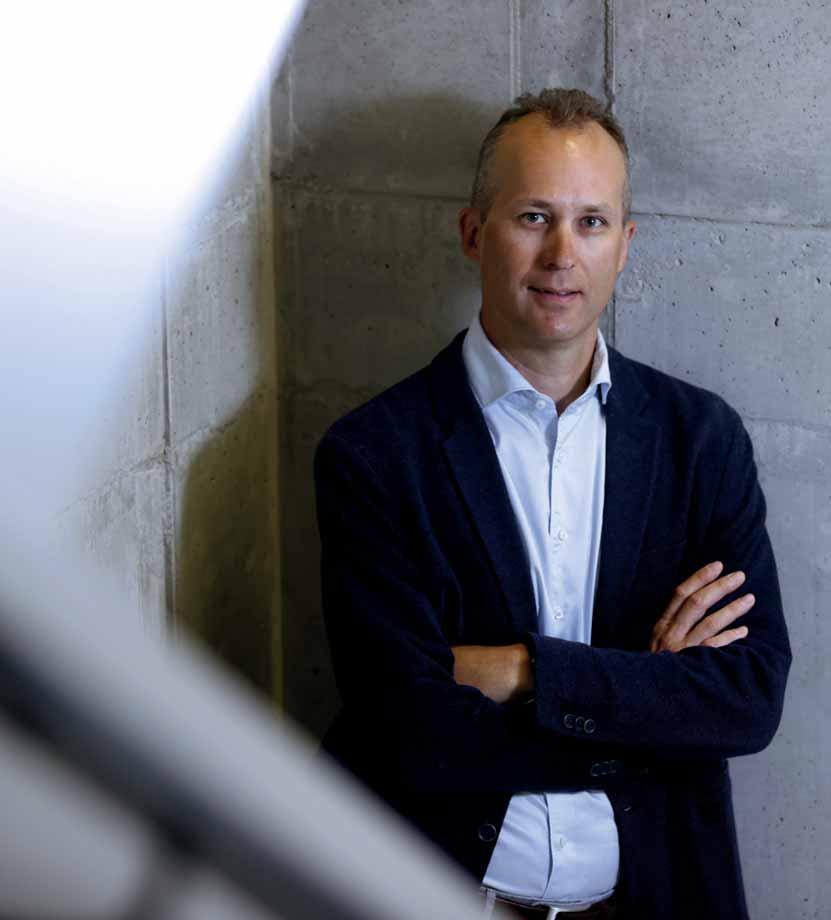 INTERVIEW WITH FILIP KŘESŤAN, PRODUCTION AND TECHNICAL DIRECTOR OF METROSTAV
INTERVIEW WITH FILIP KŘESŤAN, PRODUCTION AND TECHNICAL DIRECTOR OF METROSTAV
Metrostav operates in more than 15 European countries
To find a Czech person who has never heard of Metrostav is a mission impossible. It is the biggest Czech construction company, with a 50-year-long history, originally founded to build the Prague metro. Later on, it successfully expanded its activities into other segments of the construction market as well. Since 1991, it has begun to establish subsidiaries, and further development has continued. In this interview, we talked to the Production and Technical Director of Metrostav, Filip Křesťan.
Can you tell us about yourself and your work with Metrostav? Why did you choose this company?
I joined Metrostav back during my studies at the Faculty of Civil Engineering. The world of the socalled “big construction” fascinated me so much that I immediately knew what I wanted to do in life. I am a person who likes to see materialized work behind me, and this is what makes our field unique. What I specifically like best about Metrostav is the people. Our company is based on our people and a respect for their work. Many of our employees have been working here for decades. We are always trying to develop our technologies and set the trend in the construction industry. We give space to young colleagues to find employment with us, and to develop. Experienced builders teach young people the craft of building, and young people in turn bring in the new trends of modern times.
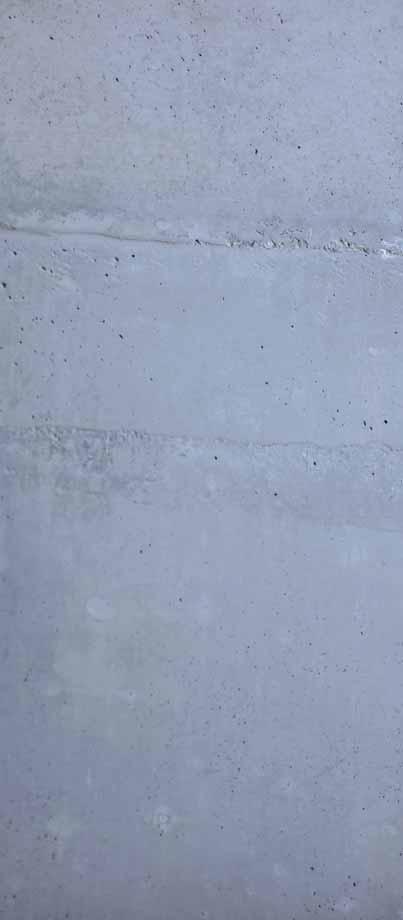
41
Text: Martina Hošková and M. Zisso; Photo: Archive
Before we come to modern times, what about a few words about Metrostav’s history?
Metrostav was founded in 1971 as a spin-off of the national company Vodní stavby, with the purpose of building the metro in Prague. In 1991, it was transformed into a joint-stock company, and gradually began activities in other sectors of the construction market.
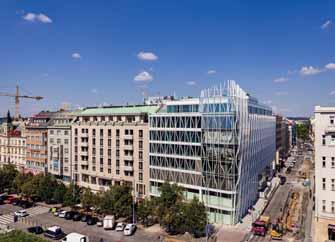
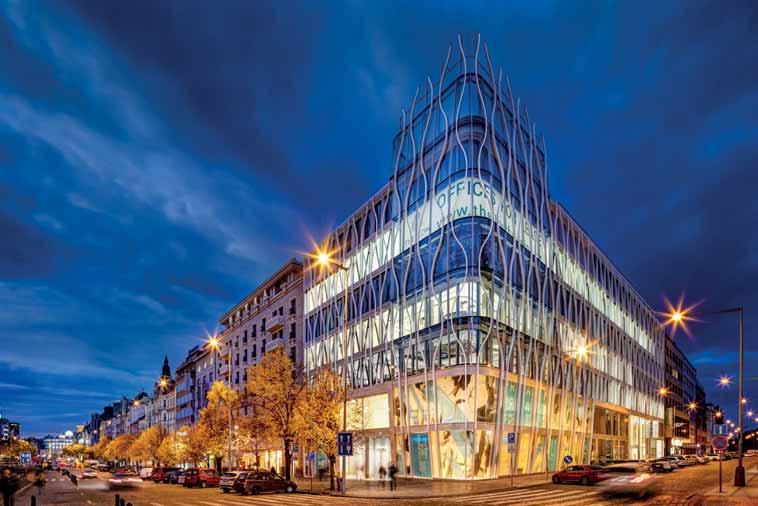
Now, it operates in all segments of the construction industry, constructing not only underground structures but also transport, civil, ecological, and industrial structures. Metrostav continues to focus on its original segment – underground construction. Excavations are also carried out, using NRTM,
Drill&Blast, and TBM technologies. We are one of the few companies that excavate tunnels, subways, collectors, and other specific projects, while also using traditional mining methods.
You became the company’s Production Director last year. Has it changed anything in your life?
I have been in this position since July 2021. The view of the construction environment is more complex. In my work, I encounter a more diverse character of buildings, some of which I did not have much experience with before. Fortunately, the basic building principles are the same everywhere, and I can follow them.
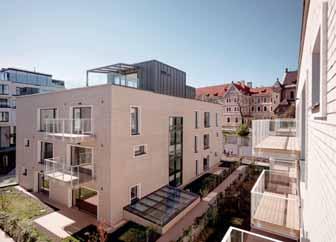
In my free time, I keep my old habit of active relaxation. I am an active person and enjoy all kinds of sports, but mostly you can see me biking or skiing. When I exercise, I best clear my head, and get the best ideas too.
Today, Metrostav is the largest construction company in Czechia, and the third largest in Central and Eastern Europe. How many countries does Metrostav operate in?
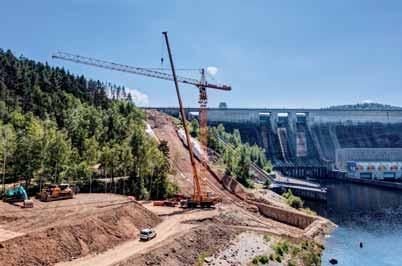
Currently, Metrostav builds all over Europe. Most of our projects are in Scandinavia, in the segment of bridges and tunnels. We have other projects in Germany, for example. We operate in over 15 countries in Europe. The current situation is very complex, mainly because it is unstable and difficult to predict. I hope that the situation will stabilize soon, and that the decline in construction production expected today will not be so great. Metrostav will definitely handle this difficult period, and will be much stronger and more resilient once again.
Metrostav certainly is a big player in the market. What will happen if you could not participate in new public contracts for some time? How will it affect the construction market situation?
From my point of view, non-participation in public contracts will affect the entire Czech construction industry. During the celebration of 30 years of the Czech Chamber of Authorized Engineers and Technicians, when the chamber selected the 30 most important buildings of the last 30 years, Metrostav’s signature was on half of them. From this point of view, the construction market will be significantly affected.
What has been your greatest construction adventure so far?
The construction profession is all about implementing

technical solutions, so we need to be prepared to carry out construction and we don’t like adventures. From a technical point of view, a very interesting building was the construction of the building above the Strahov Tunnel, where we built a residential house on the steel bridge, which spanned the two tubes of the tunnel.
I know it is like asking a father which child he loves best, however, is this the project you are most proud of?
I like all of the buildings, each of them was a great experience for me. Among those that influenced me the most was the above-mentioned Sacre Coeur 2 project above the Strahov tunnel, and for example the River Diamond in Prague Karlín, the River Park hotel Kempinski in Bratislava, and the Medvědín apartments in Špindlerův Mlýn. Even more than individual buildings, I am influenced by the people I work with and gather experience from. I have been very fortunate to have colleagues like that, and I thank everyone for their cooperation.
What is the biggest challenge and opportunity that you see ahead of the company right now?
We live in uncertain times, which we have not been used to for a long time. Dealing with the specific problems of the present will be difficult and complex, but Metrostav will certainly manage this time, just as it has managed many complex and demanding periods and constructions. Regarding technical and implementation challenges, we have plenty of them all the time. However, it will be very important for us to maintain and develop our construction art so that we are still able to carry out challenging projects, and at the same time also attract new and young technicians and craftsmen into the industry.
43
INTERVIEW WITH FILIP KŘESŤAN, PRODUCTION AND TECHNICAL DIRECTOR OF METROSTAV

44
It is extremely easy to work with CZECH PARTNERS
Text: Martina Hošková and M. Zisso; Photo: Archive
If you are Czech and haven’t been to Latvia yet, chances are that after reading our interview with Latvian Ambassador Ms. Gunta Pastore you will suddenly feel the urge to change that. Not only does she give us a list of things we have in common and explains what “Sveiks, Švejk!” means, but she also expresses her high appreciation of the beauties of both countries... which, of course, produces the same effect in the recipient. And through all this beauty, a whiff of the current situation in Europe suddenly penetrates, as she speaks about the most positive element of our cooperation.
You are a career diplomat, working for the Foreign Ministry of Latvia for almost 30 years. Can you tell us more about yourself?
I am from a beautiful place in Latvia, called Piebalga. It resembles your Moravia, with scenic landscapes and deep-rooted cultural traditions. I have a great family, with many traditional get-togethers that usually bring us to my grandparents’ place.
I have always been interested in foreign policy and international relations. I have earned a PhD in International Relations in parallel to my day-to-day work – apparently, my job is also my hobby. Before the Czech Republic, I was posted to Denmark, Sweden, and the UN in Geneva, while a big part of my working life was spent in the Ministry headquarters, including the time when Latvia sought accession to the European Union. Therefore, I understand the great value of European cooperation.
You arrived in the Czech Republic four years ago. What has been your impression of it?
I am fascinated by the vibrant cultural life of Prague and its rich architecture. It is impressive how Czechs take care of their cultural heritage. I also get a certain feeling of home in Prague because the same exact Škoda trams that rumble through the city are also the ones we have in Riga.
During my stay here, I have seen most of Czechia, and its beauty never stops surprising me. But most of all I admire the Czech people. They are proud to be Czechs. They are hard-working and creative, and they
also know how to enjoy a glass of beer. I love the very special Czech humor. During my stay here in Czechia, I have made great Czech friends.
It is extremely easy to work with Czech partners - they are open, supportive, and efficient. And, of course, in Prague, we have a very active diplomatic life, with so many great colleagues. A very special diplomatic activity here in Prague is the annual joint Nordic-Baltic National Days celebration, which brings our region closer to the Czechs. This year we celebrated it for the 14th time.
You mentioned that you love travelling. What else do you do in your free time?
Usually, I love doing sports and travelling – in Latvia and elsewhere. And as I engage in all this in Czechia, I am inspired to do it even better. Czech people are great at sports, they know how to bike, to hike. Riding a bicycle has also allowed me to explore different parts of Czechia which are not in the typical travel guide.
Your country is a beautiful holiday destination. What can you tell us about your homeland in this respect?
While living outside Latvia, I have come to appreciate the beautiful nature of my country even more – the Baltic Sea with its coastline of white sand, the vast forests. There are not that many countries in the world where people can go to the forest to pick berries and mushrooms.
45
OF LATVIA
INTERVIEW WITH H.E. MS. GUNTA PASTORE, A MBASSADOR

 INTERVIEW WITH H.E. MS. GUNT A PASTORE, AMBASSADOR OF LATVIA
INTERVIEW WITH H.E. MS. GUNT A PASTORE, AMBASSADOR OF LATVIA
Nature is what binds Latvian people to their land and culture. Singing is another local tradition that unites Latvian people both at home and abroad. The Latvian Song and Dance Festival is an official part of the UNESCO Masterpieces of the Oral and Intangible Heritage of Humanity. It gathers around 50,000 choral singers, folk dancers, and tens of thousands of viewers.
Latvian cities, especially Riga, offer plenty of options for those who enjoy walks, lively cultural scenes, iconic art-nouveau architecture, and medieval buildings in Old Riga.
Like Czechs, Latvians love beer. Although they drink less of it in a year than the Czechs do, they still cannot let go of the frothy drink. When Czechs crave the taste of home while visiting Riga, it is available on almost every corner, sometimes even in stylish settings, such as a pub called Sveiks, Švejk! (Hi, Švejk!).
Both Latvia and the Czech Republic are ice-hockey nations. Next year, Latvia is hosting the World Championship, and the year after it will take place in Czechia.
What is the current status of Czech – Latvian relations?

We have excellent and friendly relations, and I am sure we will continue to build strong bonds in politics, economy, security, culture, and people-to-people contacts.
The most positive element of our cooperation is
the presence of Czech soldiers in the NATO mission in Latvia, where they are together with nine other nations in the Canadian-led battlegroup.
Cultural cooperation is particularly prominent. Artists and musical bands perform in concert halls, while museums and galleries exhibit visual arts. Joint co-production of films has gained momentum, and Latvian movies were shot at Barrandov Studios.
The presidency of the EU Council is one of the most important rights and demanding tasks of EU member countries. How do you rate our current performance?
The Czech Presidency of the EU Council is doing impressive work in a complicated international environment.
Latvia shares all of the Czech Presidency priorities, but most of all we appreciate the very firm support that the Czechs are offering to Ukraine.
The Czech Presidency is really fulfilling its motto, “Europe as a Task: Rethink, Rebuild, Repower”, and showing its leadership in the European Union.
This interview is for your National Day. Can you make a wish on this occasion?
My wish goes to people in both Latvia and Czechiacherish your legacy of independence, and safeguard the statehood of your country! Whatever we do and wherever we go, let us remember our roots.
47
Celebration of Latvian National Day at the Embassy in Prague, with the Latvian diaspora and Czech friends
INTERVIEW WITH H.E. MS. GUNT A PASTORE, AMBASSADOR OF LATVIA
When you find a LIKE-MINDED FRIEND, you want your relationship to grow
Text: Martina Hošková and M. Zisso; Photo: Archive
“…Thai cuisine, Thai massage, and the Buddhist way of life. All of these are a perfect combination for a holiday destination,” promotes her country the Ambassador of Thailand, Mrs. Phasporn Sangasubana, and I have no doubt that many of us Czech people are nodding our heads in agreement. Meet the eldest child of a diplomat’s family, who had no passion for this profession at first, but then ended up proudly serving her country for three decades.
We have briefly revealed some information regarding your background already. Can you tell us more about yourself, please?
As you said, I was born into the humble family of a diplomat. I am the eldest child of the family, which means I am the boss. My parents have always encouraged me to have confidence in myself, and thanks to that I love to have adventures and challenges in my life. In the same way, due to the love and care that I received from my family, I was taught to perceive life in its fullest form. The truth is that nothing is just rosy in life. However, together with my family, I am proud to be Thai and I love to contribute as a member of Thai society. As a child of a diplomat, I had no passion for the idea of me becoming a diplomat myself, as I had seen my father’s working life since my early childhood. In the hard times, though, my father asked me to do just that, and I gave him my promise. Voila! I passed one of the most challenging exams of my life, and became a full-fledged diplomat in 1987. Since then, three decades have passed. And in 2017, I was promoted to Ambassador of Thailand.
You have been serving in the Czech Republic for one year so far. What is your experience of a diplomat’s life in our country and elsewhere?
First, I have to say that Prague is not an unknown place to me, as I have visited this beautiful city many times as a tourist. I am certainly honored to have the opportunity to live and work in the Czech Republic. I appreciate the Czech Republic for its beauty in historical, cultural, and natural aspects, and the good and hospitable nature of
the people. During my 35 years of service in the Ministry of Foreign Affairs of Thailand, I have been posted in six countries. I am very happy that the Czech Republic is where I serve my last posting before retirement.
The professional background of 35 years of service certainly gives you the right to give advice to the young generation of diplomats. Can you share some of your experience with our readers?
As a member of a diplomat’s family, I have been groomed to the challenging and hectic lifestyle of this profession since childhood. The position of an ambassador is another honorable hat that I am wearing. In all positions, I have been committed to full responsibility and dedication.
One (piece of advice) is to do your very best every day, and with an open mind. Challenges can be changed into opportunities by this mindset. You need to be observant, to be able to have “a good story to tell” in all circumstances. It also helps if you enjoy travelling and being exposed to new people and environments, as I do.
Thailand is known as a popular holiday destination. How do you promote your country?
Thailand is fortunate to possess a treasure of natural landscapes from beaches to mountains, as well as a rich cultural heritage such as Thai cuisine, Thai massage, and the Buddhist way of life. All of these are a perfect combination for a holiday destination.
Even though you can say that a good product sells itself, we, in fact, owe a big part of our success to the
48 INTERVIEW WITH H.E. MRS . PHASPORN SANGASUBANA, A MBASSADOR OF THAILAND

49
efforts of the Tourism Authority of Thailand and their offices all over the world. More precisely, Team Thailand, which comprises of the Royal Thai Embassy and other government offices in a particular country, regularly collaborate on organizing events about Thailand. And what they all have in common is including tourism elements in their context.
I would also like to mention that Thailand now positions our tourism as green travel. We are the first country to implement the UNESCO Sustainable Travel Pledge nationwide. More than 500 hotels have signed the pledge to eliminate single-use plastic and promote local culture, such as using local elements for decoration.
What is the status of Czechia - Thailand relations?
Both Thailand and the Czech Republic have enjoyed amicable relations for almost 50 years, but our connections can be dated back to the time of the royal visit of King Rama VII and Queen Rambhai Barni to Czechoslovakia in 1934, or even earlier to the historical record of the first presence of Czech missionaries to Thailand in the 17th century. Both countries share common values, from human rights and democracy to a sustainability approach. Certainly, when you have found a good like-minded friend, you expect your relationship to grow into a partnership.

That is what is being promoted by both sides. There are more areas where we can create synergies - Thailand can provide food security, share the concept of sustainable development through the Sufficiency Economy Philosophy for development, and collaborate on cyber security and the space program. At the same time, Czechia can become another education destination for Thai students, as well as a partner in two-way tourism. In any case, I look forward to celebrating the 50th anniversary of Thai - Czech diplomatic relations in 2024.
The Czech Republic started its second EU Council presidency term in July. What are you, as a representative of Thailand, an ASEAN member state, expecting in this regard?
I applaud the outward-looking perspectives of the Czech Republic. The Prague high-level dialogue on the Indo-Pacific has expanded beyond the policymakers to engage with the business and academic sectors, resulting in the well-reflected views of society in the region. I myself witnessed the Czech Republic’s approach of transforming “words” from dialogue into “actions”. I appreciate the Czech Republic for forging practical relationships with non-EU countries like Thailand and other ASEAN member states, on contemporary agendas like environment, space technology, and cyber security. My expectation is that Czechia is able to instil many constructive initiatives, Indo-Pacific being one of them, created under its presidency into the EU agenda so that they are active and will become more meaningful under subsequent presidencies. ASEAN is a dynamic and high-potential region that has a lot to offer - for example, abundant resources (especially human capital), and growing markets.
So, I look forward to the 45th anniversary of ASEAN-EU relations, occurring under the presidency of the Czech Republic in the EU Council, at the end of this year.
You are giving this interview on the occasion of the National Day of Thailand. Do you have any wishes for your country on this special day? And maybe for the Czech Republic too?
I think I may sound like a beauty pageant contestant now, but let me share my wish for peace all over the world, including for both Thais and Czechs. Whenever a conflict arises, no matter which corner of the world, everyone is affected by its ripples.
50
INTERVIEW WITH H.E. MRS . PHASPORN SANGASUBANA, A MBASSADOR OF THAILAND
Text: M. Zisso; Photo: Archive
October 25, 2022 - Speaker of the Chamber of Deputies Markéta Pekarová Adamová spoke and actively participated at the First Parliamentary Summit of the International Crimean Platform which took place in the building of the National and University Library in Zagreb and was attended by more than four dozen heads of parliaments and their delegations representing signatories of the International Crimean Platform from around the world. In her contribution, she emphasized the need for continued support for defiant Ukraine and the establishment of an international criminal tribunal for crimes of Russian aggression. In addition, the Speaker of the House signed a memorandum of understanding with her Ukrainian counterpart Ruslan Stefančuk in Croatia. „The main purpose of the memorandum is to support the principles of parliamentary procedures and to build the institutional capacity of the Verkhovna Rada of Ukraine in connection with the post-war reconstruction and integration process of the country into the European Union. Specifically, it is mainly about the issue of increasing the openness of the parliament to the public, training professional staff and sharing experience and knowledge between individual legislators,“ concluded chairperson Markéta Pekarová Adamová
The opening of the summit included speeches by the
speakers of the Croatian and Ukrainian parliaments, Gordan Jandroković and Ruslan Stefančuk, as well as Croatian Prime Minister Andrej Plenković. Ukrainian President Volodymyr Zelenskyy addressed the summit via video greeting.
„I am convinced that all criminals must be held accountable. I therefore insist on the establishment of a special international criminal tribunal for the crimes of Russian aggression in Ukraine. If we fail in this effort, it will be a severe blow to the international order based on shared humanistic values,“ said the speaker of the House of Representatives, Markéta Pekarová Adamová, among other things, in her contribution to the conference. Among the special guests of the conference, together with the Speaker of the Czech House, the Speaker of the House of Representatives of the United States Congress Nancy Pelosi, the Speaker of the Federal Assembly of the Federal Republic of Germany Bärbel Bas and the Speaker of the NATO Parliamentary Assembly Gerald E. Connoly spoke. At the end of the summit, a joint declaration was approved.
The Crimean Platform brings together international partners from 2021 with the aim of jointly facing the effects and threats of the illegal occupation of Crimea by the Russian Federation.

51
The war started in Crimea, it will also end in Crimea!
Viva MEXICO Viva Republica Checa

 Mariachi Azteca de Praga and Dvorana dance group
NATIONAL DAY OF MEXICO
Mariachi Azteca de Praga and Dvorana dance group
NATIONAL DAY OF MEXICO
On the occasion of the 212th Anniversary of the Independence of Mexico, and 100 years of diplomatic relations with the Czech Republic, H.E. Ambassador Leonora Rueda hosted a special reception at the beautiful Bohuslav Martinů Hall of HAMU.




Here are selected sections of H.E. Leonora Rueda’s speech at the event: 212 years ago, in the early morning of September 16th of 1810, Mexicans started the Movement of Independence, at the call of Father Miguel Hidalgo y Costilla, nurtured by the ideals of freedom and selfdetermination that had been emerging in Europe and North America, as well as by the conditions of living of the natives. After 11 years of fiercely struggles, in September 1821, Mexico raised as a free sovereign country.
 Text: M. Zisso; Photo: Carlos Casasola
From left: Mr. Carlos Ruiz, Mrs. Valeria Gaona, H.E. Mrs. R. Leonora Rueda, Ambassador of Mexico, Mr. Martin Tlapa, Deputy Minister of the Ministry of Foreign Affairs of the Czech Republic, Mrs. Nuria Cazorla García
Mrs. Valeria Gaona and Mr. Carlos Ruiz
Mariachi Azteca de Praga
Text: M. Zisso; Photo: Carlos Casasola
From left: Mr. Carlos Ruiz, Mrs. Valeria Gaona, H.E. Mrs. R. Leonora Rueda, Ambassador of Mexico, Mr. Martin Tlapa, Deputy Minister of the Ministry of Foreign Affairs of the Czech Republic, Mrs. Nuria Cazorla García
Mrs. Valeria Gaona and Mr. Carlos Ruiz
Mariachi Azteca de Praga
OF
NATIONAL DAY
MEXICO
Happy Hearts Chorus
During the 20th Century, after the Revolution and the establishment of the Constitution of 1917 - in force up to the date, Mexico solidified its integration as a democratic federal republic. Today, when we talk about Mexico, we refer to a country of 128 million people, with an ancient heritage, a cultural richness and a solid macroeconomic framework on the rise, despite pressing global conditions like climate change, international organized crime, the aftermath of COVID-19, and the impact of the war in Ukraine. Today, it is the 15th largest economy worldwide and a leading exporter: the 11th in the world and the 1st in Latin America. With Europe, we have an ongoing and successful Free

Trade Agreement signed in 1997. But after more than 22 years, things have changed. That is why we hope that the Modernized Global Agreement Mexico-EU, coping with those changes, gets the necessary ratification under the Czech Presidency of the EU Council. This would be the “cherry on the cake” for the celebrations this year of the Centenary of the Establishment of Diplomatic Relations between our two countries. Throughout these 100 years, Mexico and the Czech Republic have maintained excellent friendly bonds, based on mutual respect, understanding and economic cooperation. The birth of Czechoslovakia in 1918 is tied in time with the consolidation of the Mexican republic. The communion of interests and ideals between our countries were revealed in many of the historical processes during the 20th century. Let´s just recall President Lazaro Cardenas’ allegations against the Pact of Munich of 1938 at the League of Nations; the Mexican condemnation of the Soviet intervention in 1968.
In the XXI century, the dynamism of our economies has positioned Mexico as the main trading partner of the Czech Republic in Latin America, with around 1.8 billion dollars last year and a growing interest regarding investment opportunities. Likewise, Mexico remains on the list of Czech tourism; the scientific and technological cooperation has enhanced and the student exchanges are steadily increasing, as well as an important inter-parliamentary dialogue.
Despite the geographical distance, I am convinced that we will continue working, hand in hand, for the construction of more bridges of friendship and cooperation for many centuries ahead.

55
H.E. Mrs. R. Leonora Rueda, Ambassador of Mexico, Mr. Martin Tlapa, Deputy Minister of the Ministry of Foreign Affairs of the Czech Republic
From the top left: Mr. Aitor Veitimilla, Mr. Eric Cervantes Martínez, Mr. Jaroslav Jiřík, Mr. Hugo Juarez Carrillo, Mr. Carlo s Quiroz, Mr. Miguel Angel Vilchis Salgado, Mrs. Miroslava Eichnerová, Mr. Attila Tanka, Mrs. Stanislava Řánková, Mrs. Štěpánka Kristová, Mr. Martin Chmel, H.E. Mrs. R. Leonora Rueda, Ambassador of Mexico, Mrs. Dominika Bernáthová, Mrs. Patricia Chumacero, Mrs. Marbella Michel Arias , Mrs. Kenya Arroyo Navarrete, Mrs. Natálie Kepková
EXPERT EYE WITH DMITRI BABICH
Let´s invite NATURAL STONE back into our interiors
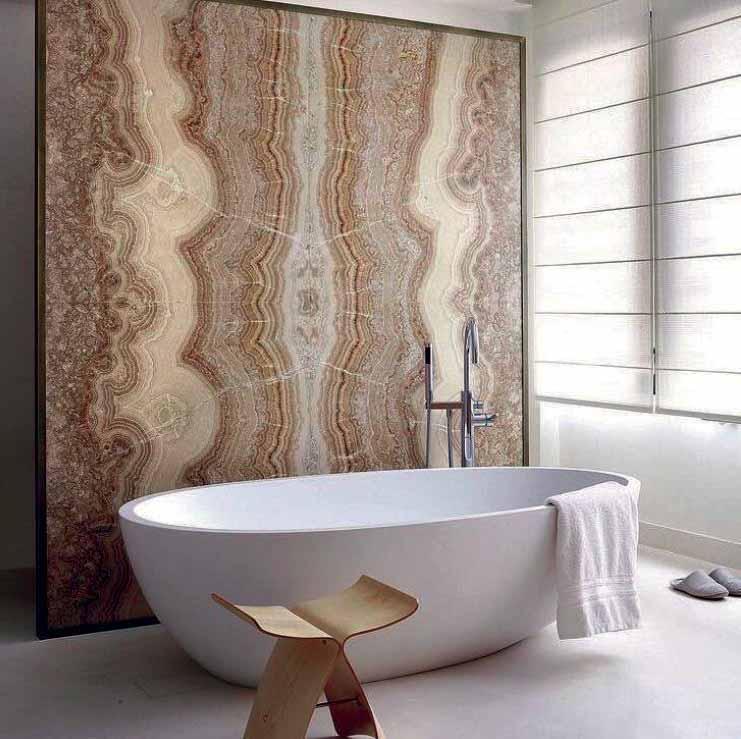 Text: Dmitri Babich; Photo: Archive
Text: Dmitri Babich; Photo: Archive
Dmitri Babich, founder and CEO of KNF Marble & Granite s.r.o., is a natural stone specialist with over 17 years of experience in the industry. The company supplies natural stone for private and commercial clients in the CR and Central Europe, and delivers, as well as develops, custom projects with natural stone in both exterior and interior aspects. www.knfmarble.com
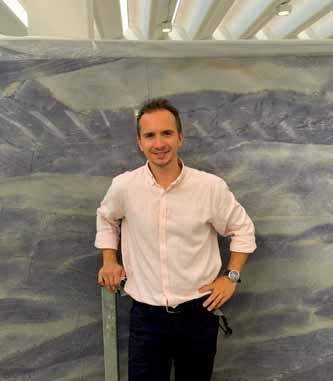
How to choose the right stone
Natural stone has been one of the most used elements in construction since the beginning of time, due to its excellent characteristics. Today, we can see a great comeback of natural stone, and the key to keeping the current trend fresh is using it in small doses, by which I mean in accents and statement pieces (rather than in amounts that overwhelm the eye). In this case, less is infinitely more.
How do you choose the right stone for your project, though? Well, the choice is greatly based on your personal preference. There is a wide spectrum of colors and patterns, so choosing the right color of stone is vital. Some shades can subtly tie the whole project together, whereas others draw in your eye and attention. Lighter shades expand the space, while darker hues add mood. Each stone has a distinct personality, and it is important to find the one that the project resonates with the most.
There are also practical aspects to selecting your stones, however. Not all stone is suitable for all jobs. For example, it is not recommended to use marble or onyx on a kitchen countertop, as the materials are softer than granite or quartzite and will require a lot more looking after. Therefore, when choosing the right stone, it is important to consider the purpose of the project and consulting about your ideas with a natural stone specialist. Budget is another important factor to consider, as the range in price of natural stone is almost as huge as the range of available colors.
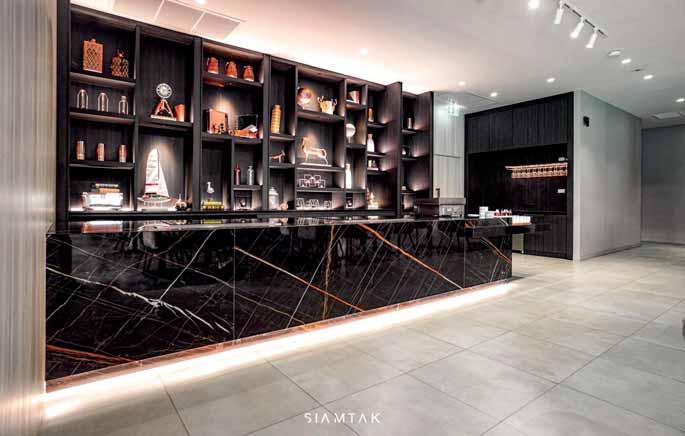
57
Nature is strong in creating uniqueness
Materials like marble, granite, quartzite, and onyx are not only practical, but are also beautifully unique. No two slabs are identical, and every piece has its own character - this is what makes natural stone so attractive, as it allows every project to have its own uniqueness, without the need for a special design. Mother nature still holds the upper hand in this. What’s also interesting about natural stone is the fact that flat surfaces are not the only way they could be utilized - with the right tools and skills it is easy to work on them to create amazing, curved shapes, sculptures, and carvings.
Another reason why natural stone is such an amazing material is that it has such a huge range of possible finishes, resulting in the same material looking completely different with a different surface finish. Almost no engineered products have such a choice in surface finishes. Besides the standard polished and honed finish, there are also flamed, brushed, leather, acid washed, split faced, sandblasted, tumbled, textured, sawn, and custom 3D design surfaces. This gives designers and projects such an amazing tool to be able to use the same material in different parts of the same project, as each finish can also create a completely different look if applied horizontally or vertically.
Natural stone wins over engineered materials
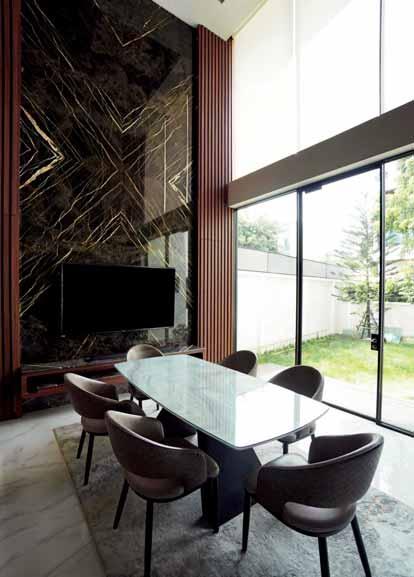
Natural stone has many advantages over engineered materials. Firstly, as we already mentioned, natural stone is more unique in its colors and patterns, and can be more beautiful than anything man-made. Secondly, natural stone can be just as durable as any engineered material, and sometimes withstand even more. It can be restored, re-polished, and repaired, though that is not possible to do with quartz or porcelain. Thirdly, the cost of natural stone in comparison to engineered materials can be considerably lower. You can find quarries of natural stone all over the world, which makes some materials cheaper because logistically they have lower costs. Last but not least, natural stone is a “green” material. The process of quarrying, cutting, and processing has a much lower carbon footprint than many alternatives.
Natural stone can sometimes be considered a luxury product but it is not always expensive, and thanks to modern technology it can even be cheaper than many other types of products for interiors or exteriors. For example, 2cm-thick slabs of Italian white marble could cost as low as €50-60/m2 (1.250-1.500 Kc/m2) in Prague. Obviously, materials like Onyx or Brazilian quartzite can easily cost over €500/m 2 (12.500 Kc/m2). Of course, you need to consider the cost of work as well, but with the right natural stone supplier, controlling all the costs is easy.
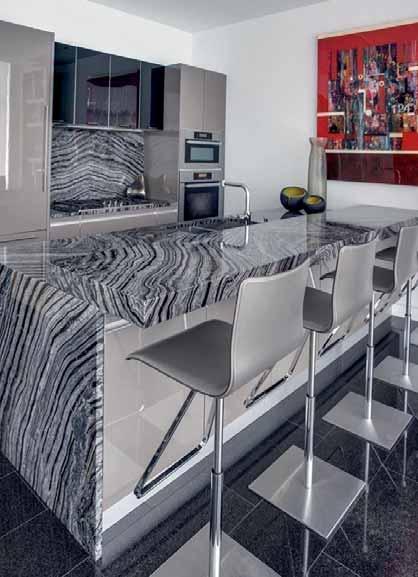
58
EYE WITH
EXPERT
DMITRI BABICH
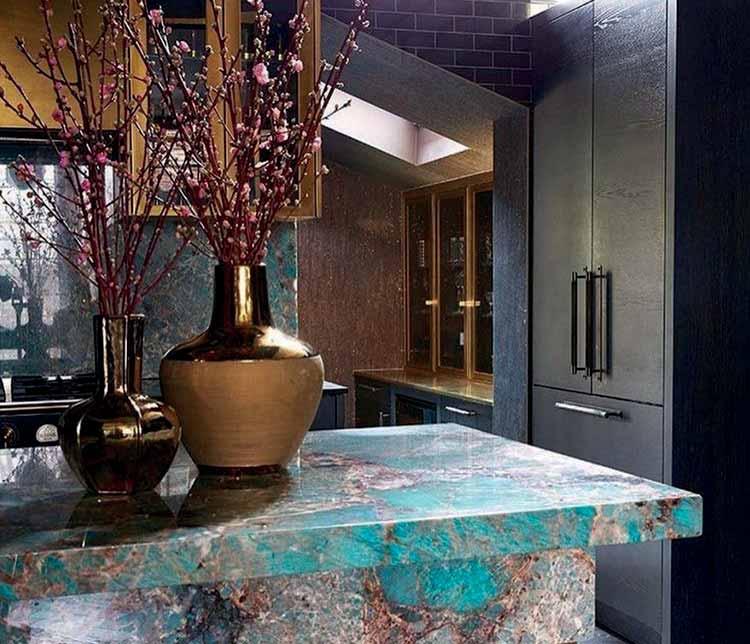
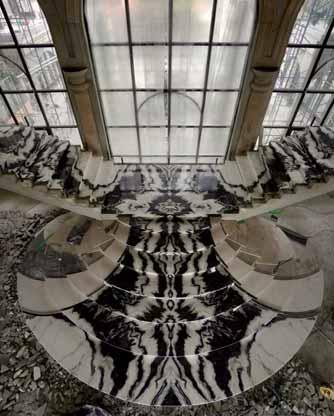
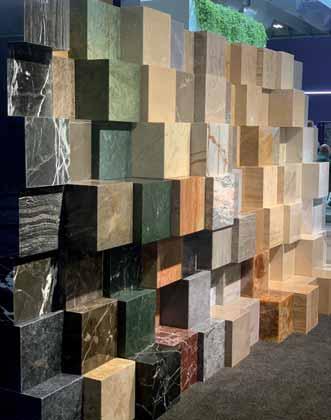
59
INTERVIEW WITH H.E. MR. ILIRIAN KUK A, A MBASSADOR OF ALBANIA

The Czech EU presidency always marks a major event for ALBANIA
60
Text: Martina Hošková and M. Zisso; Photo: Archive
The current Albanian Ambassador to the Czech Republic, Mr. Ilirian Kuka has been with the embassy here since 2014. In our interview he, among other things, drew attention to the fact that Albania’s greatest European Union integration milestones both happened during Czech presidencies. “We are very pleased with the strong support that all Czech political parties have shown towards Albania’s EU integration aspiration. We have found a strong ally in Czechia”, said the Ambassador appreciatively.
Before becoming an ambassador, you had an interesting and successful corporate career. How did that change come around?
To start from the very beginning, let me talk about Tirana, my hometown. Here, I was born, grew up, and in 1993 graduated from the University of Tirana, Albania. After this graduation, I moved to Italy to continue my studies at the University of Bari, graduating there in 1997 with the diploma of Doctor of Sciences in Engineering. Later that year, I moved to Boston, Massachusetts in the USA to further my education and start a working career. After working in different multinational companies such as State Street Corporation, Gillette Company, Procter & Gamble Co., etc., I moved back to Tirana in 2005 to take over the role of General Director of AlbTelecom a.s., the state-owned, largest telecom company in Albania. The government at the time hired me to run and prepare the company for privatization, which was completed in 2007.
In 2008, I founded and managed an investment company focusing on investments in CEE and the Balkans region, with the main investment activities being in Albania, Kosovo, and the Czech Republic.
From 2014 to 2018, I assumed the role of counsellor at the Embassy of Albania in Prague, focusing on economic diplomacy. In 2018, after completing the posting, I returned to Tirana just to be assigned as an Ambassador of the Republic of Albania to Czechia, presenting my credentials to President Miloš Zeman on 6th December 2018.
Joining the embassy in Prague 8 years ago, you must have had plenty of time to experience this country. What is your impression?
I have a strong attachment to the Czech Republic, and to Prague in particular. As you said, I was posted here for the first time in March of 2014, being in charge of business and economic affairs between Albania and Czechia. Prague is my favourite, with its architecture, parks, museums, services, small coffee shops, and nice restaurants. I have been to many places here, but if I am to name but one, I can say that I am very much attached to “Staroměstské náměstí” with its magic and history that almost every old building can offer. It simply surprises me every day anew.
I have also visited many places outside of Prague, but feel that I have not travelled enough. Every time I go to
a new place, I promise myself that I will have to come back because of the nice feeling I get during the visit. I have visited all regions, but in the South Moravian region I still have a few cities that I need to see.
Do you enjoy your ambassadorial role? Does it
fit your preferred lifestyle?
Serving as an ambassador is a very demanding engagement with strict boundaries, but at the same time it is also very rewarding. It is a position that gives you the possibility to make a difference on many levels, especially in the relationship between countries. The Czech Republic is a very central country, and has become a very important factor in the regional and European political scene, which has also intensified our work as an embassy and increased the number of activities that we need to follow. As a result, we all have less time for our families, which I think has a major impact on our lifestyle.
Albania is a NATO member state, and wants to join the EU as well. Do you feel supported in your efforts?
Albania became a full member of the NATO Alliance on 1st April 2009. For EU membership, we applied on 28th April the same year, during the first Czech presidency, and on 19th July 2022, during the second Czech presidency, Albania was approved to officially start the EU integration negotiations. It is quite interesting that both of Albania’s integration milestones happened during Czech presidencies. We are very happy for the strong support that all Czech political parties have shown towards Albania’s EU integration aspiration. We have found a strong ally in Czechia, one that is always pushing back the sceptical countries in order to complete the integration of Albania and all other Western Balkan countries (into the EU).
NATO membership and EU integration are not just about benefits, economic or political. It is more about a place of belonging. With the fall of communism in the 1990s, we got a taste of what the democratic world can be. Albanians have gone through a very harsh dictatorship during the time of communism. This is a reminder for our experience to not be repeated, and this is one of the reasons why 94% of the Albanian people are in favour of joining the EU.
61 INTERVIEW WITH H.E. MR. ILIRIAN KUK A, A MBASSADOR OF ALBANIA
You have mentioned the current presidency of the Czech Republic in the EU Council. Is there anything you would like to add?
We had been expecting a stronger focus on the integration process of the Western Balkans, and this materialized from the first days of the Czech presidency. We were very supportive of the European Political Community summit, organized very well by Czechia. The political agendas of our countries are similar, focusing on promoting equality, prosperity, and protecting human rights. Albania has been promoting these values during our current term as a non-permanent member of the UN Security Council, and Czechia has been doing the same during its EU presidency term. Both our countries have aligned fully in supporting Ukraine and strongly condemning the Russian aggression.
Considering all you have said so far, can we evaluate the status of Czechia-Albania relations as being very good?
Indeed, the status of our bilateral relations is at its highest level. As I have already mentioned, Czechia has been a strong supporter and advocate of Albania’s EU integration process. During the Czech EU presidency, it was decided to organize two major events in Albania:
– The Ministerial of Interior and Justice EU / Western Balkan, taking place in Tirana on 3-4th November 2022 and
– The Summit of EU / Western Balkans being held in Albania in December of 2022. Both events reflect the importance given to the integration of the Western Balkans into the EU, and the great status of the political relationship between Czechia and Albania.
What about the relations between common people?
Czech people have been discovering Albania in recent years. Before the pandemic, the number of Czech visitors was increasing by double digits every year. This year, we have seen the same energy in visitors, and direct flights were increased to four times per week during the summer season. The flights were almost fully booked, which makes us believe that upcoming numbers will be even higher than pre-pandemic ones. In Albania, Czech tourists are discovering our nature, mountains, sea, culture, and food, but more importantly, they are discovering the friendliness and harmony of the Albanian people. I am very happy that many Czechs are falling in love with Albania and are becoming our returning visitors. Of course, the Embassy has done media campaigns and participated in different events, presenting to audiences what Albania has to offer. We can already see the supportive role of the positive feedback coming from people that have already visited Albania. These satisfied visitors are not returning alone from Albania, but are bringing along their positive experiences.
You are giving this interview on the occasion of your National Day. Do you have a special wish for your country?
This year, on 28th November, we will commemorate 110 years of Albania’s independence. My wish for Albania is to prosper as a dignified member of Europe, together with other democratic countries, in a safer world without war and with less injustice.
2022 is also the year of the 100th anniversary of establishing diplomatic relations between Albania and Czechia (Czechoslovakia). On this anniversary, I wish for us to continue the strong relationship between our countries, for the benefit of both our peoples.

62
The BUSINESS is changing
Finland has been one of my favourite countries ever since my Finnish friend Maarit told me a long time ago that she only had a studio apartment, but with its own sauna, of course. Now, the new Ambassador of Finland to the Czech Republic, Mr. Pasi Tuominen, follows tradition by saying, “I really like ice swimming and will continue it here if possible”. We’ll keep our fingers crossed for you, Mr. Ambassador.

63
Text: Martina Hošková and M. Zisso; Photo: Archive
You were officially accredited as Finland´s ambassador to Czechia in July of this year. Can you tell us a bit about yourself and your impressions so far?
Regarding myself, I can say that I feel almost as young as I was when entering the foreign service in 1997. Recently, less than twenty years ago, I have found some grey hairs. My daughter has grown up and studies in Helsinki, and we are enjoying Prague with my wife Marjut Kuokkanen. I love ice swimming and will continue it here if possible. Like all Finns, we have a summer cottage back home, to be precise actually two, one at a lakeside and the other with a field view. And my impressions of the Czech Republic? Friendly, polite, and welcoming. It really feels good to be here and sense that Finland is an interesting partner for Czechs. In my free time, I like to learn about Czech and Slovak society. I have recently taken up Czech lessons, so I try to work on my language skills. The study of languages is my big passion. My wife and I have been living in the Czech Republic for quite a short time yet, so we like to walk around the town a lot and explore not just Prague but the whole beautiful Czech Republic.
What is the most difficult part of being an ambassador?
Leaving the country where one has served. In four years, you have learnt the local politics, colleagues, and culture, and are now able to navigate through society. You have most likely made friends as well. And then, all of a sudden, you are in another culture because of the rotation system. However, I must admit, this is one of the best, nicest, and most rewarding parts of being an ambassador at the same time, too.
Before coming here, you were assigned to other countries by the Ministry of Foreign Affairs, and prior to that, you were in Lebanon with UNIFIL (United Nations Interim Force in Lebanon). Based on your experience, can you give a piece of advice to the next generation of ambassadors, please? The business is changing, be interested in everything around you, especially in digitalization. Next-generation diplomats must understand not only human interaction but also the digital environment. You may not have a car and driver, so be prepared to use public transport or a bicycle.
Your country applied for NATO membership. What benefits can be expected from that?
NATO membership will strengthen Finland’s security in the changed security environment, and improve stability and security in the Baltic Sea region and Northern Europe. Finland’s strong defence capability and resilience to crisis will also strengthen NATO and the collective defence of the Alliance. With Finland and Sweden becoming NATO members, the threshold for using military force in the Baltic Sea region will rise, which will enhance the stability of the region in the long term. NATO is a stabilizing actor in the Baltic Sea region. When Finland and Sweden join NATO, all the Nordic countries will be NATO members. This means that the Nordic countries can advocate together for issues important to them within the Alliance.
Finland is a holiday destination favourite. How do you promote your country?
By now, everybody knows that Finland is cool. It is a good destination in the summer because it is not too hot, and in the winter because it is nice and cold. Nature is one of the advantages of Finland, but you can also find fine dining and cultural events in the middle of nowhere. As an example, I can mention Mänttä-Vilppula, a fantastic culture town about 300 kilometres north of Helsinki. In the middle of the forests.
The presidency of the Czech Republic in the EU Council started in July this year. What are you, as a representative of your country, expecting? Success.
Indeed. What about the status of Czechia-Finland relations, can you evaluate that?
Bilateral relations are excellent. We are very much likeminded partners, the cooperation is based on shared values, and EU membership, plus Finland’s and Sweden’s accession to NATO, will further deepen our relations.
This interview is done on the occasion of your National Day. What comes to your mind in this context?
Independence has never been self-evident in Finland. We have a country, which is worth defending, and I hope that the will for that becomes even bigger. Trust in authorities and politicians has been very high and I hope it remains this way. The future must be built by new generations, and climate change requires us to find sustainable solutions and the replacement of fossil energy. It is important also for our security.
64
INTERVIEW WITH H.E. MR. PASI TUOMINEN, A MBASSADOR OF FINLAND

Algerian National Day Reception was held on 01/11/2022 at the Hotel Diplomat – Prague
Text: M. Zisso; Photo: Archive
On the occasion of the 68th Algeria’s National Day Celebration The Ambassador of Algeria H.E. Mr. Belkacem Zeghmati, hosted a reception at Diplomat Hotel Prague.


66
H.E. Mr. Belkacem Zeghmati, Ambassador of Algeria
NATIONAL DAY OF ALGERIA
Here are selected sections of H.E. Mr. Belkacem Zeghmati speech at the event:

The first of November 1954, and related events in Algeria, on the internal and external levels, was a historical and articulated turning point that changed radically and deeply the history course of the Algerian people.
My country, Algeria, since its restoration of its full national sovereignty, has been working hard to continue the battle of development and construction, and as an active member of the international community, has never spared any effort to contribute to achieving international peace and security around the world. The Algerian diplomacy, thanks to its historical depth and long experience, has never contributed to the exacerbation of disputes between countries, peoples and nations. On the contrary, it always stands at the same distance from the parties to disputes, calling each time to give priority to dialogue and negotiation as a civilized manner in the sense of resolving disputes and avoiding all forms of violence and use of force.

67
Ambassador Mr. Belkacem Zeghmati during his speech and Mr. Moustafa Dahou, First Secretary of Foreign Affairs at the Embassy of Algeria
NATIONAL DAY OF ALGERIA











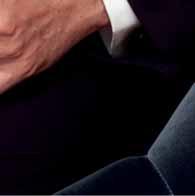






We are neighbours cooperating in the HEART OF EUROPE
Text: Martina Hošková and M. Zisso; Photo: Archive
For a diplomat, it is “a top priority, getting to know people and establishing networks. Something which proved to be somewhat complicated in the beginning of my term here because of COVID-19”, points out Mr. Andreas Künne, German Ambassador in Czechia. Nevertheless, he describes his appointment here as having “a very dense agenda with a number of highlights”. What moments have been the most remarkable for him so far? Does he consider the United Nations useful? And how does he view the current Czech Presidency of the EU Council?
What brought you to the profession of ambassador?
Being curious, fascinated by other languages, cultures, and countries, being a bit of a policy aficionado, and never having lived in any place for longer than seven years even as a child all combined to make the foreign service a logical choice for me. And when joining the diplomatic service, to eventually be an ambassador probably is top of the wish list for any hopeful young diplomat. It definitely was the case for me. Then again, when you look back at a career, especially a somewhat successful one, things appear to be inevitable – but they are not. Saying that dedicated, hard work made me become an ambassador would thus be just part of the answer. Having had the good fortune of being at the right place at the right time is at least an equally important part.
You have been in the Czech Republic for over a year. Can you share some of your impressions and highlights of that time?
A diplomat’s job description includes, as a top priority, getting to know people and establishing networks. Something which proved to be somewhat complicated in the beginning of my term here because of COVID-19. Fortunately, it seems that this pandemic is no longer dictating our daily lives, and I make full use of meeting people wherever and whenever I can.
Since I arrived in August 2021, we have had a very dense agenda with a number of highlights. For me, it all started with the successful and fruitful visit of Federal President Steinmeier in August 2021. Right after the elections in our two countries last fall, we had a truly historic number of bilateral visits here in Prague. Chancellor Scholz was
here twice, as were Foreign Minister Baerbock and Vice Chancellor Habeck, to name but a few. The sheer number of delegations coming to Prague and the Czech Republic over the last fifteen months underlines the high quality of our relations. This also holds true for relations between the neighbouring federal states Bavaria and Saxony and the Czech Republic. Both Prime Ministers met Prime Minister Fiala, and almost all cabinet members from both Dresden and Munich visited their Czech counterparts over the last ten months. This is all the more important since cross-border relations are at the heart of our relations – the more stable and sustainable they are, the more resilient our relations are also on the national level.
On a lighter note, I am very happy that, after a long COVID-induced pause, we were able to invite the public to an open-door day at our embassy at Lobkowicz Palace, when we welcomed over 5,000 visitors. Having a flash mob orchestra and choir perform the Czech, German, European, and Ukrainian anthems at Lobkoviwcz’s historic balcony was truly a ‘goosebumps’ moment and a very special highlight.
What is the most difficult part of being an ambassador in Czechia?
The most difficult thing is learning Czech. I am afraid it will take me ages to come to a point when I am satisfied with my linguistic proficiency... Having said that: I am pleased that many young Czechs are learning German, and that the number of Germans learning Czech is increasing as well. This reflects the traditionally close cultural and economic ties between our two countries. We are very important trading partners for each other, have strong cultural and interpersonal ties, and a long
69
INTERVIEW WITH H.E. MR. ANDREAS KÜNNE, AMBASSADOR OF GERMANY
common border. In addition, being a convinced advocate of multilingualism, I hope that at least two foreign languages will remain compulsory subjects at Czech schools. In a united Europe, languages are the key to good relations.

Coming to geopolitics, it is crystal clear that the Russian war of aggression against Ukraine is a defining moment for our future in Europe. In these times, it is essential that Berlin and Prague are in constant contact on this. My main role as an ambassador is to deepen mutual understanding of our respective positions, to act as a kind of interpreter. It’s not always easy, but it is definitely a crucial element of my job here.
You love your job and times are busy. However, do you manage to enjoy some hobbies too?
Honestly, there is not enough free time for discovering the Czech landscape and culture. The Czech Republic is a wonderful country, with inspiring people. I am a fan of both classical and jazz music, and the range and diversity Prague has to offer in this respect is just amazing. Plus, I can sometimes combine work and satisfy my cultural appetite at the same time, for example when I attend the ground-breaking performances of long-forgotten works by authors oppressed and killed by the Nazis, which the Národní divadlo, under Per Boye Hansen’s leadership, has been bringing back to the Czech and Central European cultural scenes. The Federal Foreign Office supports this in the framework of the “Musica Non Grata” project. For me, personally, this is a highlight of our cooperation, and I warmly recommend attending one of the operas, concerts, and other performances until the end of 2023.
You served as a representative of your country to the United Nations for many years. In your opinion, is the UN still relevant today?
If we did not have an organization such as the United Nations, we would have to invent it. The UN is the only truly international organization, and it is the only organization capable of bringing together the world’s leaders. Consequently, the UN, its agencies, and its organizations are indispensable when it comes to trying to find global solutions to global challenges, such as climate change, safeguarding biodiversity, or global health, to cite just a few examples. Given how diverse we are on the planet, it is inevitable that the solutions we manage to find are compromises, sometimes just the lowest common denominator. Obviously, the UN has its issues. It is quite clear, for example, that the UN Security Council urgently needs reform. That an aggressor gets away with his aggression just because he happens to be a permanent member of the Council is a relic of times we had believed long gone. We need to put even more effort into reforming the UN. The Czech Republic and Germany can play an important role in safeguarding the UN’s achievements while, at the same time, pushing for reforms.
What is the current status of Czech–German relations?
Our relations have never been better. Thanks to the dedicated efforts by both sides, contacts are deepening not only in politics and diplomacy, but also in trade, science, culture, education, and many other sectors.
The German Embassy in Prague is a good example of this.
70
INTERVIEW WITH H.E. MR. ANDREAS KÜNNE, AMBASSADOR OF GERMANY
We are working to ensure that our cooperation in the heart of Europe is beneficial for both the Czech and German sides. Just a few cases in point, as illustrations: We support student exchanges and cross-border student internships, including by improving language proficiency. We host a number of events at Lobkowicz Palace, such as scientific workshops, discussions with Czech and German leaders on strategic issues, and seminars concerning Czech-German relations. Contact and networking between Czech-German experts and the public are very important to us. Thanks to this, I see how people, especially young people, truly appreciate contact with their neighbours across the border. But then again, stating that our relations are better than they have ever been does not mean that they could not improve even more. The Czech Republic and Germany can be crucial factors in moving our common European agenda forward. I believe we still have some untapped potential here. And it is our job at the Embassy to move this forward, together with our Czech and German partners.
The presidency of the Czech Republic in the EU Council started in July of this year. How do you, as a representative of your country, feel about our performance?

The Czech presidency is taking place in very turbulent times. We’re still grappling with the consequences of the COVID-19 pandemic, and the war in Ukraine, the energy crisis, and inflation have become the most pressing issues. I believe the Presidency is extremely successful. Sometimes, I do have the impression that the tremendous efforts and the truly great successes of the Czech negotiators on all levels are not sufficiently
recognized by the Czech political and media scenes. As an outside observer, I cannot but congratulate the Czech Presidency. It is thanks to the Czech negotiating skills in Brussels that good progress could be made on many important dossiers. Czech negotiators paved the way for coming to terms with the Russian aggression, concerning both our position vis-à-vis Moscow and getting our own European house in order.
What are you wishing for your country and for the Czech Republic?
I would wish that we further expand and intensify our relations and our cooperation. Whether in politics, business, science, or culture. Above all, however, I would like to see this cooperation and dialogue involve more and more citizens, and especially young people. In the border regions in the first place, but also beyond them. I hope that we will intensify efforts to learn each other’s language, enabling us to get to know each other even better. This includes being absolutely clear and fair about our history, on both sides. We have so much in common, as we both are in Central Europe. We owe it to our children to lay the groundwork for a joint future in a strong, resilient, and successful Europe. Therefore, I wish us all that we become true Europeans, being proud of our national identities, proud of where we come from, but being just as proud of our common European heritage. Looking at the near future, as the festive season approaches, I would like to wish everyone a Merry Christmas and a healthy and happy New Year.
71
INTERVIEW WITH H.E. MR. ANDREAS KÜNNE, AMBASSADOR OF GERMANY

72
INTERVIEW WITH H.E. MR. ALBERTO MORENO HUMET, AMBASSADOR OF SPAIN
Spain is a country of GREAT DIVERSITY
Text: Martina Hošková and M. Zisso; Photo: Archive
The new head of the Spanish Mission to Prague, Mr Alberto Moreno Humet has just arrived in the country. During our brief interview we unfortunately forgot to ask his opinion on the common Czech meal “španělský ptáček” (Spanish birdie), but have managed, on the other hand, to learn a bit about his first impression of the Czech Republic, the diversity of Spain, and the increasing possibilities for learning the Spanish language at Czech schools.
You have just arrived in the Czech Republic. Can you introduce yourself and tell us about your first impression of this country?
I was born in Barcelona, and have studied Journalism and International Relations. I became a diplomat in 1985, and have made most of my career in Europe. Only at the beginning, when I still was a young diplomat, I was sent to Angola. Since then, I have always been appointed in Europe: Luxembourg, Belgium, Andorra, France, and currently here in the Czech Republic.
Czechia is a wonderful country, and I am impressed by the city of Prague, where walking around is a pleasure. Clean, nice, and with a great care given to the houses and the monuments. There are also many parks. It is a nice place to get lost in.
Besides the possibility of getting lost in a strange city, are there any other difficult parts of being an ambassador?
In my opinion, there is no part more difficult than the rest. It really depends on the country you are sent to, on the level of bilateral relations, the existence of an open conflict, etc. What you have to do as an ambassador is to deal with these situations and be prepared for any changes that may occur.
I admit Angola was difficult in 1985, and there were many situations we could talk about, but overall, it was an interesting experience.
Spain, with its sea, mountains, and cultural heritage is a great holiday destination. How do you promote your country in this regard?
We try to show the great diversity of our country. Spain is a country of beaches and sun, wine, guitar, and flamenco, but Spain is also so much more. We drink wine, but we drink even more beer, we play the guitar, but we also play the bagpipes, we have a lot of sun, but also big mountains and a lot of rain in the north. We speak Spanish, but also Catalan, Galician, and Basque, we have
a very rich culture and many different cultural traditions. That is Spain. And much more.
How do you characterize the status of Czechia-Spain relations?
The relations are very good, and they are further improving. We are strengthening our political and economic ties. Both countries are an important partner for each other.
Spanish tourists are coming to the Czech Republic in large numbers, and we hope that very soon we will reach the level we had before the COVID-19 situation. The same can be said in relation to Czech tourists coming to Spain. The presence of Spanish language and culture in the Czech Republic is constantly increasing in the formal school system and in higher education. There are six Czech-Spanish public bilingual secondary schools all over the country as a result of the great cooperation between both countries, and Spanish is studied as a second or third foreign language in more than 150 primary schools and 250 secondary schools.
The presidency of the Czech Republic in the EU Council started in July. What are you, as a representative of your country, expecting?
I expect a good presidency, and the Czech government is succeeding in doing so. Our prime minister and many ministers have already been here, and everything has been very well organised. So far, we have had no problem. We are following the Presidency very closely, because all this experience will be useful to us soon since Spain will hold the EU Presidency in July 2023.
For a diplomat, being present in the presiding country always means even less free time than usual. Therefore, I cannot rest much right now, and my hobbies, like walking and spending time with my family and friends, will have to wait. Now, as I was saying before, our relations are very good, but I would like to improve them even more.
73
INTERVIEW WITH H.E. MR.
AMBASSADOR OF SPAIN
ALBERTO MORENO HUMET,
National Day of Turkey
Text: M. Zisso; Photo: Shubhranshu Chaudhary
On the occasion of the 99th anniversary of the proclamation of the Republic of Türkiye, the Turkish Ambassador to the Czech Republic, H.E. Mr. Egemen Bagis, along with Mrs. Beyhan N. Bagis, held a reception at the Grand Bohemia Boat in Prague.
In front of many Ambassadors, government officials, members of the Czech Parliament and Senate, and distinguished guests, H.E. Mr. Egemen Bagis greeted everyone in the name of Turkish President, His Excellency Recep Tayyip Erdogan, and his.
It is a great and fortunate coincidence that the two nations celebrate their national days one after another
on the 28th and 29th of October. Allow me to express our sincere thanks to the military band of the Czech Defense Ministry, Director of the Ankara State Opera & Ballet Ms. Feryal Türkoğlu and the head pianist of this esteemed institution Ms. Esra Poyrazoğlu, for their performance of the Turkish and Czech national anthems.
October 29, 1923 marked the dawn of a new era for Turkey as the proclamation of the Republic was greeted with applause in our Parliament. The Republic‘s founding father Mustafa Kemal Atatürk, who led Turkey to victory in the War of Independence, was unanimously elected as our first President. Ever since the proclamation of the Republic, my country has achieved comprehensive and far-reaching political,

74
NATIONAL DAY OF TURKEY
H.E. Mr. Egemen Bagis, Ambassador of Turkey and his wife Mrs. Beyhan N. Bagis





75 NATIONAL DAY OF TURKEY
From right: Mr. Radek Linhart, H.E. Mr. Hideo Suzuki, Ambassador of Japan and his wife Mrs. Atsuko Suzuki, H.E. Soren Kelstrup, Ambassador of Denmark and his wife, H.E. Daan Huisinga, Ambassador of the Netherlands and his wife Anne, H.E. Mr. Egemen Bagis, Ambassador of Turkey and his wife Mrs. Beyhan N. Bagis, H.E. Mr. Shahzad Aryobee, Ambassador of Afghanistan, H.E. Mr. Khalid Jamali, Ambassador of Pakistan and his wife Mrs. Zahra Ahmed, Mr. Sadun Saran, Turkish Businessman and Ms. Aylin Saran, H.E. Dr. Gunta Pastore, Ambassador of Latvia, H.E. Tanja Strnisa, Ambassador of Slovenia and her husband Anthony Strnisa, H.E. Mr. Alberto Moreno Humet, Ambassador of Spain
H.E. Mr. Egemen Bagis, Ambassador of Turkey and his wife Mrs. Beyhan N. Bagis
economic and social reforms which have firmly anchored Turkey among the democratic and modern nations of the world.

After decades of peace, the conflict in Ukraine has once again brought war to Europe’s doorsteps. The repercussions of this war can be felt all across Europe and the world, as soaring inflation and the food and energy crisis impact everyone. It is times like this where humanity must work together to overcome shared challenges.
The main pillar of Turkish foreign policy is based on Atatürk’s visionary foresight ‘‘Peace at home, Peace abroad’’. Since the beginning of the war, Turkey has maintained a balanced position and worked hard to serve as a diplomatic outlet to bring the parties together. Through our cooperation with the United Nations, and under the leadership of President Recep Tayyip Erdogan, our country was able to broker the Black Sea Grain Initiative, which unblocked over 9 million tons of grain, which we hope will resume
again soon. Turkey also mediated a prisoner swap, bringing more than two hundred Ukrainians and Russians home to their families. Our country hopes to build on this diplomatic success and work towards ensuring a ceasefire.
The common values that we share with the Czech Republic, coupled with common objectives on many foreign policy issues, constitute the essential ingredients of the cooperation between our two countries. Despite the pandemic, I am pleased to announce that bilateral trade between Turkey and Czechia will exceed the target of 5 billion USD by the end of this year.

There is every reason to believe that relationship between our countries will become even stronger in the years ahead.
It is an exceptional honor for me to express my heartfelt gratitude to Gazi Mustafa Kemal Atatürk, founder of the Republic of Türkiye, our War of Independence, martyrs and all our fallen heroes.

76
NATIONAL DAY OF TURKEY


77
From right: H.E. Mr. Ilirian Kuka, Albanian Ambassador, H.E. Mr. Kevin Peter, Nigerian Ambassador, H.E. Mr. Egemen Bagis, Ambassador of Turkey and his wife Mrs. Beyhan N. Bagis, wife of the Hungarian Ambassador, H.E. Dr. András Baranyi, Ambassador of Hungary
NATIONAL DAY OF TURKEY
From left: Czech Deputy Foreign Minister Mr. Jaroslav Kurfurst, H.E. Mr. Egemen Bagis, Ambassador of Turkey and his wife Mrs. Beyhan N. Bagis, former Czech President Václav Klaus and his wife Livia
Speaker
the Chamber of Deputies
The Speaker of the Chamber of Deputies of the Parliament of the Czech Republic, Markéta Pekarová Adamová, led a parliamentary delegation on an official trip to neighboring Poland from November 7 to 9. Together with the President of the European Parliament, Roberta Metsola, and a number of other foreign guests, she first took part in a memorial service on the grounds of the former complex of Nazi extermination camps in Auschwitz. The gathering was held to mark the anniversary of the anti-Jewish pogrom known as Kristallnacht. „The memory of the Holocaust has become part of our collective identity. And the names of those who were murdered in Auschwitz and elsewhere will not be forgotten. However, in today‘s world, hatred, and intolerance are increasing and we must increase our efforts to stop them,“ said Markéta Pekarová Adamová, in her speech.
From Auschwitz, the parliamentary delegation moved to Warsaw, where a working meeting followed with the Speaker of the Polish Sejm, Elzbieta Witek. „Our common
strategic goal is the victory of Ukraine. The key to this is Czech-Polish solidarity with Ukrainian refugees and coordinated action against the Russian aggressor. Speaker Witek and I also agree that active parliamentary diplomacy plays an important role in all of this today. At the end of our meeting, I invited the Speaker to visit Prague,“ said Markéta Pekarová Adamová. A meeting was also held in the Polish Parliament with Senate Speaker Tomasz Grodski. „The main topic of our meeting was the joint effort for complete raw material independence from Russia and the energy security of Central Europe. The construction of the Stork II gas pipeline would make a very significant contribution to both, the financing of which we are now working intensively together with our Polish colleagues from European sources,“ added the Speaker of the Chamber of Deputies, Markéta Pekarová Adamová.
The work program also included a meeting with the Czech

78
of
in the Sejm: The key to Ukraine’s victory is Czech-Polish solidarity and intransigence against evil
Text: M. Zisso ; Photo: Archive
Meeting of two Parliament Speakers: Markéta Pekarová Adamová and Tomasz Grodski
diaspora, representatives of the Belarusian opposition, and an excursion to the Warsaw Transport Company, where they are now using subway cars from Škoda Transportation. „I see the supply of train sets for the Warsaw metro as one of the most visible export successes of a Czech company on the Polish market in recent years.

I am glad that the products of the Czech company will serve the inhabitants of the Polish metropolis in their daily lives. At the same time, it is proof of the dynamically developing trade and economic relations between our countries,“ concluded speaker Markéta Pekarová Adamová.

79

Magic
is ART, and it is hard to judge yourself
Text: Martina Hošková and M. Zisso; Photo: Archive
Tomáš Podzimek is an example of what may happen when your child gets a magic kit for his 9th birthday. Now, he is 18, finishing high school, and at the same time performing at places such as the Dubai Expo and the Four Seasons, Prague. He talks to us about his school, family, best friend, and of course magic… especially about magic. He also recommends a popular trick to learn: “Making money appear is generally a good thing. Everybody can make it disappear.”
Dear Tomáš, can you please tell us about yourself?
I’m 18 years old. I started doing magic when I was 9. Since then, I’ve been practising and performing magic. I’ve discovered my passion for card magic, and nowadays I also like to perform on stage. I study electrical engineering and automation in Jičín. In February 2022, I performed at the Dubai Expo 2020, at the Czech Pavilion, and also did an interview for the Dubai national television, Dubai One. Later that year, I had a show at the Four Seasons hotel in Prague. Currently, I perform mostly at company events and team buildings, but also at conferences, celebrations, and weddings.
What made you become a magician?
When I was 9 years old, I got a magic kit as a Christmas gift from my aunt. I immediately opened it and started practicing the first tricks, and I performed them later that day. This was the day that sparked my passion for magic. I will remember it for the rest of my life. After this, my long magical journey had begun.
You are 18 years old and still a high school student. How do you manage your student obligations along with your shows?
In elementary school I always managed to have good marks, and in high school as well. My dad likes to say, as a joke, that I got good logical thinking skills from him. When I need to perform magic after school, that is okay. But a small problem can come up when the magic show takes place at a time when I have my school classes (sadly every weekday from 8am until 2pm). It wasn’t a problem in the
past though - I used to only miss a few school days a year due to magic shows. This year, however, is a bit different because I’m in the fourth year of high school, and in May I’ll have my final exams. On top of that, I’ve got more shows now. But I know that I can always go and communicate that to my school. I am really lucky to have great teachers. Also, studying electrical engineering helps, especially in magic.
Do your family, friends, and colleagues support you? Yes, they have always been there for me. I’m so grateful to have very supportive family and friends. When I started with magic, I needed to get to magic conventions somehow. My granddad and grandmother were always taking me to these conventions and lectures, they enjoyed them, and they saw my progress in magic. Dad drove me to my shows. Sometimes it was in the next village, other times it was far from home. That was a huge help, without which it would have been so difficult to improve in magic. Nowadays, I can drive a car, so I usually travel to shows with my amazing girlfriend. Luckily, I also have amazing friends – for example, my best friend Leopold Novák. He is kind, helpful, and supportive anytime I need advice. That’s because he is an amazing card magician, so he understands magic too, and we can help each other. Overall, that is a crucial thing in every industry – to have somebody who you can discuss your projects and share successes and failures with, and also learn from them together.
What was the first magic trick you ever learned? The first trick that I learned was something simple, with a small piece of rope. It was the one from the magic kit.
81
INTERVIEW WITH TOMÁŠ PODZIMEK, MAGICIAN
I remember it wasn’t that good, although it was good for magic beginners. When I performed it for my first audience, my family, they liked it. When somebody asks me for a simple trick for beginners, I usually suggest card tricks. That´s because basic card tricks are usually easy to learn, yet they are pretty effective. There is just one problem with card tricks – you need to carry cards with you all the time. So maybe, especially in the case of little kids wanting to start with magic, my suggestion would be a simple coin trick, like, for example, ‘vanish’ – people usually carry one or more coins with them. Making money appear is generally a good thing too. Everybody can make it disappear.
When did you perform your first magic show?

My first magic show, in public, took place in a magic competition in Jičín. Luckily, Jičín was just 20 kilometres from my home so my granddad didn’t have a problem driving me there. I was eleven and was pretty nervous. I had never performed in public or in front of other magicians before. I prepared four card tricks, and competed with them. I came in 3rd in the juniors’ competition. Fortunately, the magicians there were so generous, and they gave me suggestions afterwards on how I could improve my magic. So, I’ve been doing magic for 9 years, and have been performing it in public since 2015. I was always a diligent student of magic, but had always taken it as a hobby. At the beginning of 2020, I flew to London for a magic convention because, as a young magician, I got free entry. The only thing I had to do to get (my free entry) was to perform in a charity show, which I did in Jičín again. This London event was one of the biggest magic conventions in Europe. Besides me, there were, I think, 10 other magicians from the Czech Republic, and, in total, around 700 magicians from all parts of the world. It was a full 3 days of magic performances, talks, and lectures. I never saw anything like that before, the atmosphere was so great. There, I realized that I’d love to do magic full-time, as a professional magician. From then on, I’ve been practising for many hours a day, every day.

What is your favourite magic trick, and why?
I’m gonna talk about two if that’s okay. The first one is for my stage show. In this trick, everybody in the audience gets four different cards. They shuffle the cards and throw one card away at a time. In the end, everybody is holding just one card. And the card is the same for everyone. I love this trick the most because everybody in the audience takes part in it. The only downside is that if I have a show for 500 people, then I would need 2,000 cards. On the other hand, the more people do this trick, the more powerful the trick is. Imagine seeing all the people with one card that matches yours – that is just a wonderful moment, which you rarely see in magic tricks. When you watch a magic show you usually don’t get involved in the magic trick, so it’s nice to have something like that. Another favourite trick of mine is great for just a small group, or perhaps one person. I borrow their phones and make them disappear. No, just kidding, people don’t like it when you make their phones disappear. I borrow their phones and find a celebrity in them. Then they are asked to think of any celebrity. I correctly guess which celebrity it is, and voila! It is in their phone, which I haven’t touched from the beginning. Since nowadays we use our phones for many hours a day, magic with smartphones is very popular, and I try to incorporate and invent tricks with phones more, and include them into my magic.
What is magic? Is it science, art, a trick, or reality?
That is a difficult question. The answer may depend on the way each magician perceives magic. In my opinion, magic is art. That is because you aren’t just inventing a secret – how the trick is done – but also, which is more important, (you invent) how to present the trick to the audience. If I want to include a new trick in my show, I first must think about the presentation, so that it fits nicely into the show. I then must think about the effect and how to achieve it – the secret of the trick. Or, a company might want me to invent a custom magic trick, for example, like the appearance of their new
82
product for product launch. I can’t only think of the secret and how to make it appear, but also need to think of the presentation so that it is engaging and memorable for the audience. And yes, some people do perceive magic as reality, as something that I can do. This happens very occasionally, but those people exist. It is hard to convince them that I don’t have any magical power, any gift from God. In the past, doing magic tricks meant just one thing, that you are a witch.
means two or three shows per day. And still, he invents new tricks, and improves his show all the time. Of course, he wouldn’t have to do as many shows as he does, but this tells you one thing – that he really loves magic art. Besides that, he collects magic, and has the biggest museum of magic history. His museum is a private one, but if you get lucky, you can visit. One day, when I get to Vegas, I’d really love to see his show. I believe it’s the greatest one in the world.
Can you share just one magician´s secret with us?
I’d consider myself a good magician nowadays. If you’d asked me a year or two ago, I’d have probably said no. The biggest leap for me has come this year. Generally, it is hard to judge yourself, especially in the field of magic. If you are, for example, a programmer, then you are good when you write code fast and efficiently, and the code works great and with no bugs. In magic, there are many different aspects of being good. If the spectators laugh, are amazed, clap, if you have many shows, repetitive bookings, if people like your magic, and many more. After the show, I usually sit in a quiet place with a cup of coffee and try to think about what went fantastically that night, if there were any mistakes, and what things I could improve for the next show. I always put 100% of my energy into my show, sometimes 110%. Taking all those aspects into consideration, I’d consider myself a good magician, who, of course, has a lot of space for improvement.

I never reveal any (magic) secrets. Or, actually, I do have a little secret. If you want something, dream it, and go for it. This secret is behind the greatest tricks of all time. There was an idea, at the beginning, a dream. Through a lot of effort, it was possible to form it into reality. Sometimes, it is impossible to reach it alone, or you might need help to achieve it. I once dreamt about having a show in the Four Seasons hotel in Prague. And after a few months of planning, it happened. The secret of magic for me is that anything is possible when you know the right way.
There are a lot of magicians that I like and admire. The greatest magician in the world for me would be David Copperfield. He is very well known all over the world because of his TV performances and specials. Nowadays, he performs almost every day in his theatre in Las Vegas. He is 66 years old, and has around 600 shows each year. That
Where do you see yourself in 10 years, at the age of 28? Celebrating my 28th birthday! No, really, that is a difficult question. But I’ve got one idea on my mind. I’d love to do a big stage show, not just for theatres, but also for big arenas. The show would be magical in every sense, a true experience. Suitable for people who speak English, as well as those who don’t. Generally, I think that a show like this could do well. This would of course take a lot of work, maybe even a big team. This idea might take more years than 10, or maybe less, I’m gonna see. In the coming years, my goal is to perform more all around the world. For example, in the summer, I’d like to entertain hotel guests at different hotels. I’ve already been to Dubai, London, and Prague of course, and I’m very much looking forward to where the magic could take me next!
83
Do you consider yourself to be a good magician?
What is it that makes a good magician?
Who do you consider to be the greatest magician in the world?
Speaker of the House: EU needs Moldova and vice versa
Text: M. Zisso ; Photo: Archive
October 19, 2022 - The Speaker of the Chamber of Deputies, Markéta Pekarová Adamová, made an official trip to Moldova as the head of the parliamentary delegation.

The main part of the program was a working meeting with the Speaker of the Moldovan Parliament, Igor Grosu, with whom she discussed cooperation between the two countries‘ parliaments on Moldova‘s path to the EU.
„Moldova‘s entry into the European Union, which has had candidate status since this year, is important not only for Moldova itself, but for the entire Union. The Czech
Republic, as the country holding the presidency of the Council of the EU, can help Moldova in this by sharing its rich experience with cohesion funds and the accession process. Our future is common and should take place in one family of EU member states,“ said the Speaker of the Chamber of Deputies, Markéta Pekarová Adamová, after the meeting.
At the subsequent meeting with Prime Minister Natalia Gavrilita, the two politicians mainly discussed strategic issues of energy and current raw material security in the
84
Markéta Pekarová Adamová, Speaker of the House was received by the President of Moldova, Mrs. Maia Sandu
context of the Russian war in nearby Ukraine. CzechMoldovan economic cooperation was also a topic. The Czech Republic is the fifth largest market for Moldovan exporters, and mutual trade is growing every year.
The Speaker of the Chamber was also received by the President of the Republic, Maia Sandu.

The work program also included a discussion meeting with international relations students of the state university or a visit to a refugee facility and the organization SOS Autism. It helps local children with autism spectrum disorders. These projects, together with around five dozen others, are implemented as part of long-term development cooperation with the financial support of the Czech Republic.

One of the projects is also located on the border of Transnistria, where the parliamentary delegation
headed at the end of their business trip. Transnistria is an internationally unrecognized region, which is formally still part of the Republic of Moldova, but which is de facto under strong Russian political-military influence. The Czech Development Agency has been financing the operation of the Hippocrates health and social center in the village of Dorotcaia since 2009.
„Moldova is very negatively affected by Russian aggression against Ukraine. In terms of population, the most war refugees go there. In addition, it has Russian occupation troops on its own territory. From our modern history, we ourselves know a similar situation all too well. It is therefore our moral duty to continue and support not only Moldova‘s pro-Western orientation in humanitarian and development projects, but also its territorial integrity,“ concluded Markéta Pekarová Adamová.
85
The very best buildings are both FUNCTIONAL and BEAUTIFUL
 Text: Ivo Nahálka; Photo: Archina Design Studio Prague
Text: Ivo Nahálka; Photo: Archina Design Studio Prague
Architects must remember that they create something for real people
Despite the building activities performed for the sake of experts, winning prizes in various (architectural) competitions, or building a personal monument, it does not work that way in everyday life. The real humility lies in the fact that I am going to create something – which I have to realize, as much as any other architect – for people, no matter what their preferences and tastes are, what they tend to like best, or what their feelings are. That environment is going to influence them greatly throughout their lives – both through the exterior for the people who walk around it, and for the people who are to live, work, and entertain themselves in that building.

EXPERT EYE WITH IVO NAHÁLKA
88
The energies, in this case, are just a given reality. It is true that there are qualities of energy that people do not see but they are far more important to our healthy – both physical and spiritual – lives. An architect is given a gift of talent to create buildings on earth that have, embedded in themselves, all the principles of how such a building should properly look like. Geometrically, in placement, proportion, layout, relative details, color composition, etc. These are the supporting pillars of architecture, like the five elements. That is why there are at least five laws in architecture as well. And one of them is function.


The energy comes from the universe in the form of an idea, when one is sitting over a blank piece of paper and has to come up with a building for a certain place that should meet certain criteria and functionalities. You put the first idea on paper, which has basically everything encoded in it, and you just need to develop all the elements of what makes architecture the regular architecture – proportion, size, and shape. Shape, of course, is associated with the flow of energies, where the ideal shapes in the universe are a circle and an oval. This is because the energy in these shapes flows

All ideas have potential – you just need to deploy it the right way
89 in a vibration system that is close to a human being and has a very positive effect on people’s health – both their mental and physical state.
It is a comprehensive view – all in one. And it is also a view as I perceive it. I feel that I am just a facilitator who gets an idea, develops it on paper and adds some expert knowledge to it. My experience of seeing ideas come in has always convinced me that they already have the potential, that you just need to deploy it in the right way – and it all fully works. You just check the shape, size, and placement. If you look at historical buildings, they all have a function encoded in them, and their appearance indicates, “I am a hotel / a railway station / a town hall / a block of flats”.
Without criticizing, the buildings that have deviated from the path I have just described are very technical. Such buildings have no potential for beauty in detail or colour, they are basically just a purposeful result. In fact, the building has been guided from the beginning by the idea that it will be made of glass or concrete, so it suppresses the regularities as unimportant or secondary. The result is then a uniform building, which basically has no potential for anyone to recognise whether it is a block of flats or an office building, because the glass creates a very anonymous, cold, impersonal envelope, and the architect does not reflect a human being at all – people’s ability to perceive the beauty of the building, the details, the colours. These buildings are basically the same everywhere in the world.
Buildings should make us feel good

I like to go and look at the works of other architects and admire them – not as an architect, but as a person. Unfortunately, I have no reason to go and look at a glass building again. I do not want to criticize this approach, lest anyone takes it personally, but it makes me sad since I cannot see the good that should be there for people, to make them healthy, to make them better, when they work from morning until night in that environment.
At the same time, it is also related to ecology. Most buildings like this do get awards for being environmentally friendly, for being friendly to people – it is true, but unfortunately only on the outside. This is because the materials that are now mostly used are glass, concrete, and iron, which are basically incapable of storing energy – neither heat nor cold. Even if it is freezing outside and the sun shines on the building, it suddenly becomes so warm that it has to be cooled. And cooling is the biggest consumer of electricity, therefore 80% of what is paid for energy consumption goes into the cooling of such buildings. Not to mention the impacts on people’s health. The elements of Feng Shui that relate to how nature heals us – no matter who we are, what our tastes are, how old we are – work well. When people come into nature, they can feel the energy of beauty – with its diversity and vibration, which makes all people feel good immediately – begin to affect them. And buildings should have the same ability, so that we can leave some uplifting heritage behind us in this world.
Prague Zoo´s director receives HIGHEST STATE AWARD from Mongolia
Text: M. Zisso; Photo: Archive
Mongolian President Ukhnaagiin Khürelsükh awarded Miroslav Bobek, Prague Zoo’s director, the “Order of the Polar Star” – the highest state decoration a foreign national can receive. The president’s advisor, Erdenetsogt Odbayar, presented the Order on the president’s behalf, and thanked Mr Bobek for his outstanding contribution to Mongolian nature conservation and the development of Czech-Mongolian relations.
Przewalski horses in the area where they survived the longest and where they successfully returned – the Dzungar Gobi – also thanks to our zoo
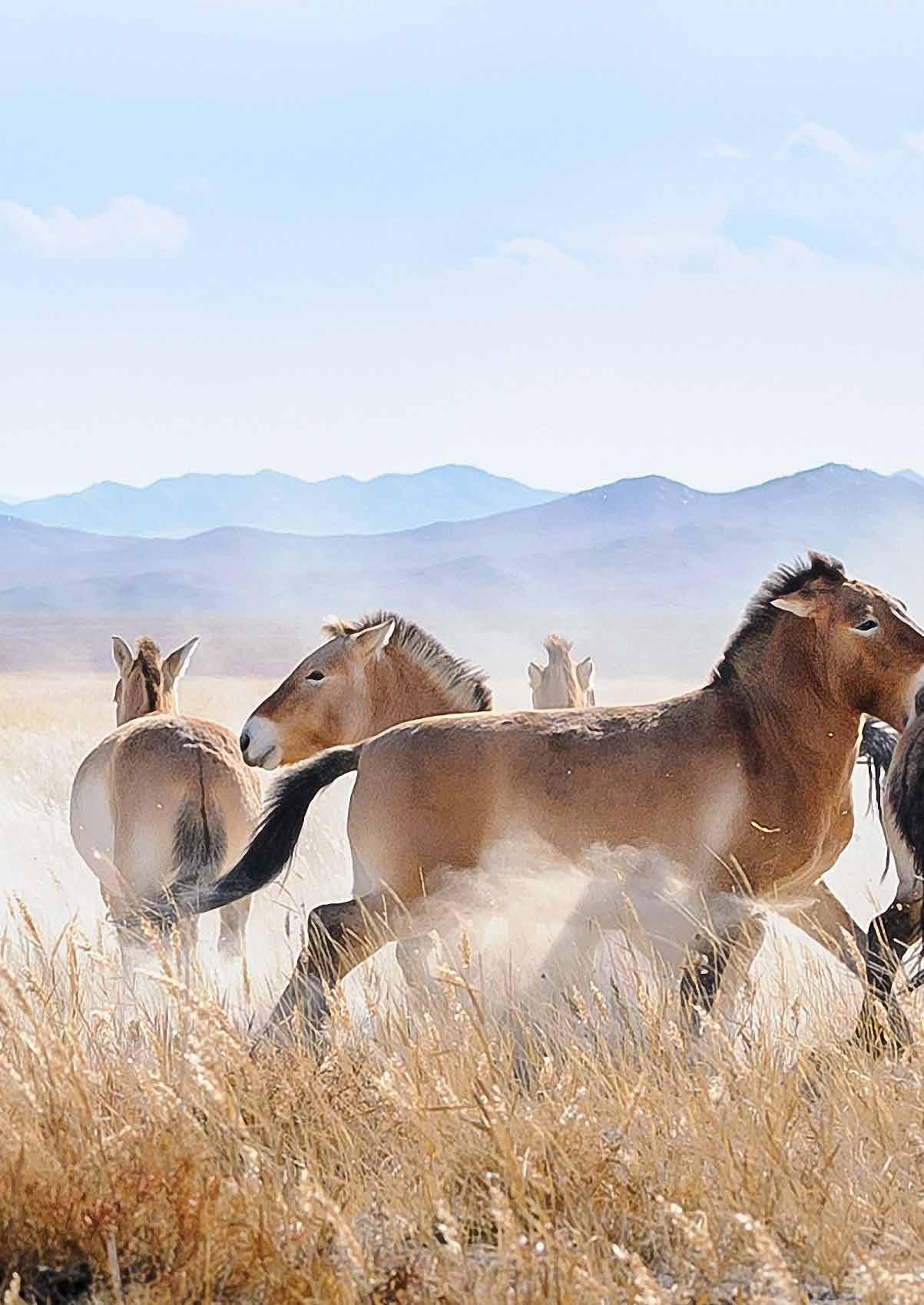


EXPERT EYE WITH MIROSLAV BOBEK
Under the leadership of Miroslav Bobek, Prague Zoo, in cooperation with the Czech Army and a number of other organizations, has carried out a total of nine air transports of Przewalski’s horses to western Mongolia. However, it has also been supporting the long-term sustainability of their return to the wild and is now preparing a reintroduction project for eastern Mongolia.
“The awarding of the Order of the Polar Star is a great honour for both the current and past staff of Prague Zoo. They have contributed decades of hard work to rescuing the Przewalski’s horse and returning it to its original homeland,” said Miroslav Bobek on this occasion. “This award comes at a time when the twenty-nine mares we transported to Gobi B by CASA aircraft not only have had over eighty foals, but also ten grandchildren and even their first great-grandchildren. Our mission in western Mongolia is accomplished, we are now turning east.”
Miroslav Bobek went on to say that Prague Zoo’s projects for biodiversity conservation would be unthinkable without the support of the zoo’s founder and the public. He pointed out that five Czech crowns from every entrance fee to the zoo go to these projects.
Jan Vytopil, the Czech Ambassador to Ulaanbaatar, highlighted this award’s significance by stating “The award

shows just how much Mongolia appreciates this Czech project for reintroducing Przewalski’s horses. The project is all the more important in a world that is facing a major decline in biodiversity everywhere.”
Prague Zoo´s director shares his experiences regularly with the readers in his books. The first was published 10 years ago and was called “Bobbles from Bobek”, the latest came out this September under the Czech title “Ryšavý knihovník a jiné zápisky” and its Czech version is already on sale (e.g. https://www.kosmas.cz/knihy/513551/rysavy-knihovnik-a-dalsi-zapisky-reditele-zoo/ ). For the full English version, you will have to wait a bit longer since it will be published at the end of the year. In the Czech & Slovak Leaders magazine, you can find the four chapters dedicated to wild horses:
92
2)
3)
4)
1)
The Last Wild Horse (Hopefully) without Question Marks
Wilderness in the Scenery of the Metropolis
A Century after Ali’s Arrival to Prague
The Return of the Wild Horses –Heading East!
The Last Wild Horse (Hopefully) Without Question Marks

The scientific paper published last year by Timothy T. Taylor and Christina I. Barrón-Ortiz may not have a very catchy title – Rethinking the Evidence for Early Horse Domestication at Botai – however, it is very interesting. After reading it, I remembered one of my favourite kaleidoscopes. Simply turn it around and the coloured glass would rearrange to form a new, radically different pattern. The work in question is also like turning a kaleidoscope. Suddenly, it gives us a completely different picture.
It was assumed for quite a long time (although not everyone agreed) that the roughly five and a half thousand-year-old skeletal remains of horses found in northern Kazakhstan might well be the oldest evidence for their domestication. That it was the people of the Botai culture who bred and used these horses as livestock and riding animals, and that maybe it was these horses that gave rise to modern domestic horses. Examples of the evidence for the domestication of the Botai horses were provided by marks from bits on the preserved teeth or the vestiges of pits filled with decayed vegetative matter, which was thought to be the remains of horse dung.
A significant change to the majority view of Botai horses came in early 2018 with the work of 47 authors led by Charleen Gaunitz. It was entitled “Ancient Genomes Revisit the Ancestry of Domestic and Przewalski’s Horses”. Based on genetic analyses, it showed that the horses from the Botai culture were not the ancestors of our domestic horses (including mustangs and all other feral forms) and that they were much closer to another lineage – namely Przewalski’s horses. According to one
of the extreme interpretations of the results obtained, Przewalski’s horses could even be the feral descendants of the domesticated horses of the Botai culture. If that were the case, then the Przewalski’s horse would be the only remaining representative of a unique lineage of horses, but not the “last wild horse”.
Cut and change the image again, now directly related to the work cited in the introduction. In it, Taylor and Barrón-Ortiz recapitulate the reasons why Botai horses cannot be considered domesticated. One of the weightier ones is the fact that the animals’ age composition, determined from the skeletal remains, does not correspond to the age structure of horses in captivity. The authors then focused on assessing the damage to the teeth that was thought to have been caused using a bit. Amazingly, they found identical damage on the teeth of wild Pleistocene equids from North America! Thus, they were able to state that the damage found on the teeth of the Botai horses was probably caused by natural developmental defects and wear, rather than by contact with a bit. This is, of course, a very strong argument in support of their claim that the Botai horses were not domesticated; rather they were wild Przewalski’s horses that had been hunted extensively by the people of the Botai culture. What’s more, the bone finds come from places that seem to be made for such hunting.
Now the likely theory is that the Przewalski’s horse is not a feral descendant of a horse that was domesticated aeons ago, but it is, in fact, what we have always considered it to be: the last, and therefore currently the only, wild horse.
93
1)
Wilderness in the Scenery of the Metropolis 2)
On Monday afternoon, we released four Przewalski‘s horse mares into the almost twenty-hectare enclosure at Prague’s Dívčí hrady. Shortly after, when I saw two of them on the horizon with Prague’s Pankrác district in the background, I felt like I was in Nairobi National Park, where the high-rise buildings of the Kenyan capital loom behind giraffes.

As expected, releasing the mares, transported from our breeding station in Dolní Dobřejov, attracted considerable media attention. Another activity, which took place two days earlier, we didn’t even announce as it was far less conspicuous, although it was equally important to us: We released about one hundred and sixty crucian carp into the former mill race on the grounds of our zoo. It was the first step to help the return of this once completely common, but today extremely endangered fish, not only into our grounds, but, hopefully, into other Czech rivers and water bodies.
Releasing the Przewalski‘s horses at Dívčí hrady and the crucian carp in the former mill race in the zoo are both examples of our efforts to preserve the biodiversity of the local fauna and flora. Although our activities aimed at global conservation have gained far more renown, at
area below Sklenářka, it was all due to our colleagues, who released them there and then spent many years ensuring that their colony prospered.
An exemplary illustration of these activities is the revitalization of the zoo’s rock massif. Here we laboriously cut down false acacias and other unwanted vegetation, so that the bushy rock steppe and the vineyard once planted here could return. This restored environment has given many plant and animal species a valuable foothold, with perhaps the most visible indicator being the increase in the population of the critically endangered European green lizard. Just as a reminder: the main aim of releasing the Przewalski‘s horses at Dívčí hrady was also to restore the local steppe habitat.
Even though, despite the pandemic of COVID-19, we continued in 2020 and 2021 our efforts to develop our conservation projects around the world, our appetite for our domestic ones also increased. Having released the Przewalski‘s horses at Dívčí hrady, in the southwestern part of Prague, we started planning and later also undertook preparations to place European bison into a corral in the northeast of Prague. Now that’s something to look forward to!
94
A Century after Ali’s Arrival to Prague 3)
Three weeks after Prague Zoo celebrated its ninetieth birthday on September 28, 2021, a century had passed from the day when the first Przewalski’s horse arrived to Prague. It was Ali, the stallion, which the hippologist Prof František Bílek obtained from Halle. Bílek accommodated him to a school farm in Netluky at Uhříněves. It happened on October 17, 1921. Later, on January 23, 1923, the mare Minka followed. And these were the two Przewalski’s horses who became the founders of Prague breeding. Thus began the long journey which culminated with The Return of the Wild Horses to Mongolia.
However, in relation to one hundredth anniversary of Ali’s arrival to Prague let’s have a look not on what followed, but on what preceded the event. What was the journey of the last wild horses from central Asia to the West? General Nikolaj Przewalski obtained the first skull and skin of a Przewalski’s horse in 1878; the scientific description was done three years later. The first living Przewalski’s horses came to the natural reserve AskaniaNova (then in the Russian empire, today at the occupied part of Ukraine) in March 1899, and later more individuals followed them to Russia. However, at that time, the biggest and from our point of view the most important expedition was already underway, financed by German animal dealer Carl Hagenbeck. Its goal was to bring Przewalski’s horses to the West.
Hagenbeck entrusted a merchant Wilhelm Grieger with the organization of the entire event, who, after various mishaps, set off to Kobdo, todays Khovd, in the winter of 1900 – 1901. At that time, it was a Chinese fortress with about 1,500 inhabitants; today it is an administrative centre of the ajmag of the same name in western Mongolia with 30,000 inhabitants. As Hagenbeck later described, Grieger reached it by taking first the Siberian railway by Moscow to Ob, then from Ob by sledge about 250 versts (one verst is 1,066.781 metres) to Biysk and then with a lot of supplies and material he continued 700 versts on horses and camels. In Kobdo then with a help of Russian merchant Asanov, who already arranged capture of Przewalski’s horses for Baron Falz-Fein, he hired one hundred of Mongols and set off with them to look for wild horses.
The captures of the horses occurred at three places from 250 to 300 versts south of Kobda, in the area where we are returning the horses now. The capture process Carl Hagenbeck later described as follows: “The horses have a habit to lay down at the watering hole for several hours. Hordes of Mongols with their horses sneak towards them, taking cover, and at a given signal the entire
company loudly shouting pounces on the resting horses that jump up and race into the steppe in terror. Only a huge cloud of dust can be seen. And from this cloud of dust individual spots start emerging in front of galloping riders, these are the poor foals that cannot yet run fast enough, and soon, when their strength is drained away, they remain behind the herd. They stop, with their nostrils flared by exhaustion and fear, frantically panting, and they are caught by a loop connected to a pole.” Let’s mention that many adult horses were shot down during that process…
It is curious that Grieger was successful beyond expectations, and because the original order was only for six foals, he drove two thousand kilometres on horseback (plus four days on a boat) to send a telegram to Hagenbeck with a question if he would be allowed to bring more horses to Europe. He was. In the end he set off for the return journey from Kobdo with 52 foals.
If the capture of Przewalski’s horses itself was apparently a horrifying spectacle, the transport of the foals was as just bad. Hagenbeck writes: “A large caravan that includes besides the captured animals their wet nurses (mares of domesticated horses – a note of M.B.) as well as animals transporting the travellers and their luggage, and thirty hired natives sets off for the long journey home. Heavily worried about the lives of the young animals Grieger slowly advances across mountains and valleys, in rain and sunshine, in heat and cold, to the nearest place connected to the world. In many mountains regions there is warmth of thirteen to twenty degrees during the day, while at night the temperature drops to the freezing point. For many of the young animals the hardships of the journey are too severe, they perished on the way despite all the care.”
Just the journey from Kobdo to Ob, from where it was possible to continue by boat, took according one of the later accounts fifty days. Pairs of foals were carried by camels. It is surprising that 28 alive foals of Przewalski’s horse arrived at Hamburg on October 27, 1901.
Two from these twenty-eight foals – a stallion later marked 11 M Biysk and mare 12 F Biysk – were purchased by Emperor William for the Agricultural Institute of Halle University. Two decades later the grandchildren of this couple of horses arrived at Prague: first the stallion Ali on October 17,1921, followed by the mare Minka, on January 21, 1923.
95
The Return of the Wild Horses – Heading East! 4)

As soon as we arrived in Ulaanbaatar, the director of the Great Gobi B Protected Area, our long-time collaborator, Ganbaatar, gave me the best news I have heard since our transports of Przewalski’s horses started in 2012. A third-generation foal has just been born in this reserve in western Mongolia! Shivers ran down my spine… In 2012, we transported four Przewalski’s mares from Prague to the Gobi by CASA military aircraft. One of them was Anežka. She had a daughter, Dodo, who gave birth to a filly, Sunder. Well, Sunder now has her own foal, Anežka’s great-grandson!
Naturally I was yearning to head west as soon as possible, to the Gobi B, but we’d flown to Mongolia to go in the opposite direction, to the easternmost part of the country. Why? When I was writing this column in Ulaanbaatar, there were exactly 938 Przewalski‘s horses in Mongolia (including the 100 foals born this year). They are found in Gobi B and Khomyn Tal in western Mongolia and in Khustain Nuruu in central Mongolia. This successful return of Przewalski‘s horses to Mongolia began in spring 1992, when two planes carrying “Przewalski‘s” from Europe landed in Ulaanbaatar shortly after each other –one with a shipment of horses for Gobi B and one for Khustain. However, there is a certain irony in the fact that much earlier serious consideration was given to returning the Przewalski‘s horses to eastern Mongolia. It never happened and only now is it being planned – by Prague Zoo in cooperation with many Czech and Mongolian organizations.
Just two days after our Ulaanbaatar meeting with Ganbaatar, we were criss-crossing the steppes of eastern Mongolia in off-road vehicles. We had returned to the Dornod area after more than two and a half years. This time, however, we were in far greater numbers. Not even COVID had stopped us working on our plan to return the Przewalski‘s horse to eastern Mongolia. Several Mongolian experts had gotten onboard – and now we finally had the opportunity to meet up and assess the pre-selected sites together.
Will there be suitable food for the horses? What about water sources? Where do the herders’ families live and where are their wintering grounds? What sort of profile does the terrain have and what are the winters like? What diseases might the Przewalski‘s be exposed to? Etc. etc. It wasn‘t always easy – for example, even the venerable professors were up to their thighs in mud to extricate a Toyota that had got stuck in the bog – but all in all, it was a great success. Next time, we will only take in two sites. One, with its scattered pine groves, is near the battlefields of the ‘opening battle of World War Two’ at Khalkhin Gol. The other, where bright yellow poppies were in full bloom at the time of our visit, is somewhat further southwest, near the Snake River.
There is still endless work ahead of us, but we believe that within a few years the Przewalski‘s horses will also return to eastern Mongolia. And I hope that one day I will see the foals of Anežka’s xth generation of descendants in the steppes there.






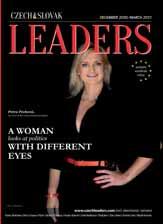
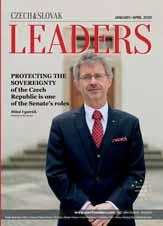
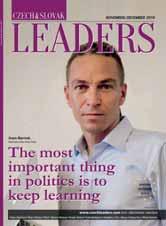
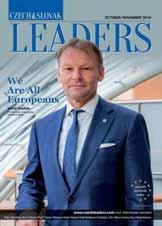
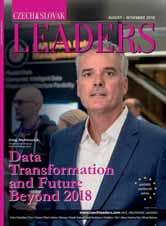
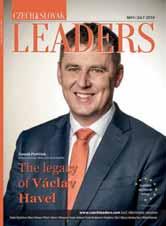
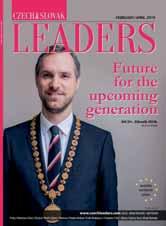
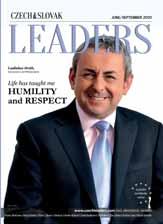
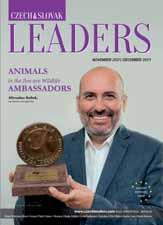
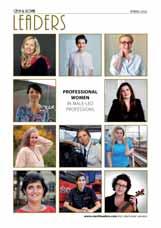
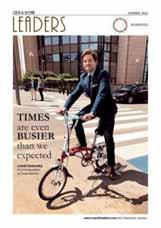
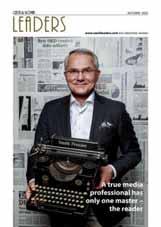
Do you want to know WHAT HAPPENED in the last 20 years? https://issuu.com/czechleaders https://www.czechleaders.com/en/ Check our magazine online from 2001 till now! ADVERTISEMENT
iota soft living is a contemporary design studio and a social project that employs, teaches and empowers women who are otherwise unable to work, by teaching them the crochet technique.
iota SWINGS TAKE THE USER TO A WILD, NATURAL, FANTASTIC PLACE. THE SWINGS WORK GREAT IN LIVING ROOMS, SPACIOUS BEDROOMS OR HOTEL LOBBIES AND SUITES.
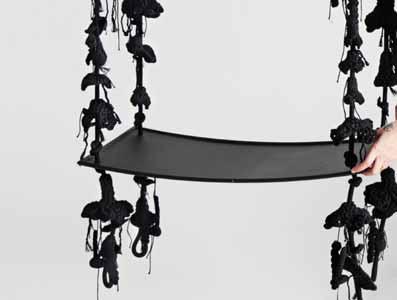
THE SWING DISPLAYS MUCH OF OUR SPECIAL KNITTED HANDWORK. THE ELEMENTS FORMING THE SWING ARE HAND KNIT FROM BESPOKE YARN DESIGNED AND PRODUCED EXCLUSIVELY BY IOTA FROM THE BEST QUALITY COTTON AND POLYESTER.
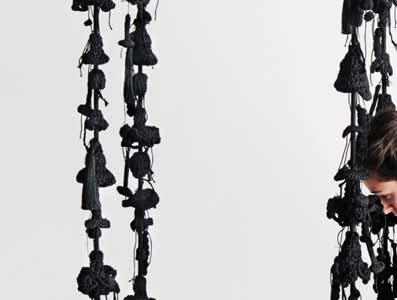
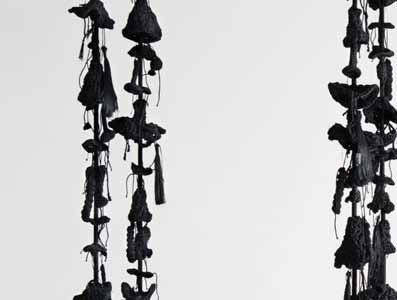
For worldwide shipping, shop - iotaproject.com
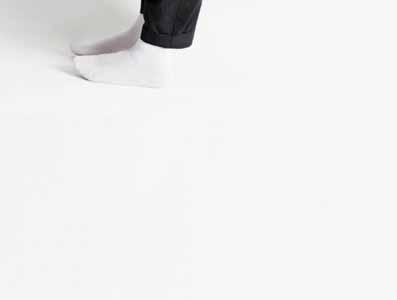
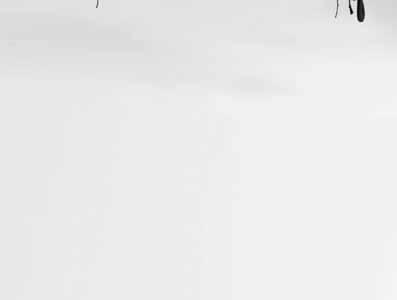
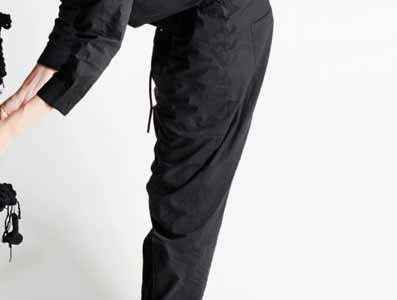
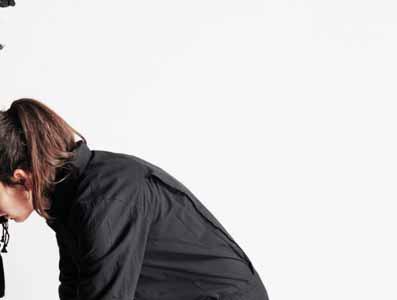
info@iotaproject.com ig: @ iota.softliving

ADVERTISEMENT
The essence of the Greek cuisine

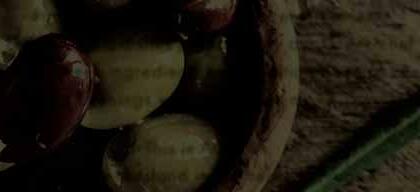











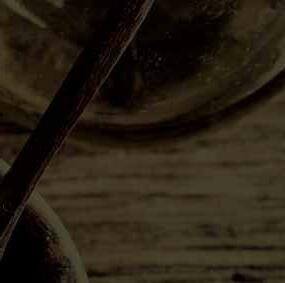
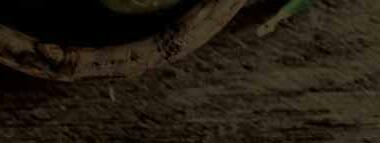


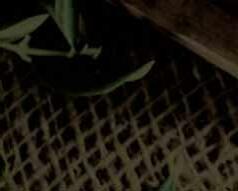
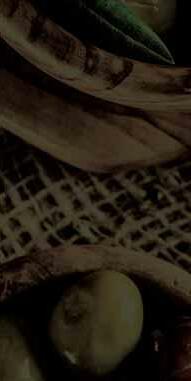
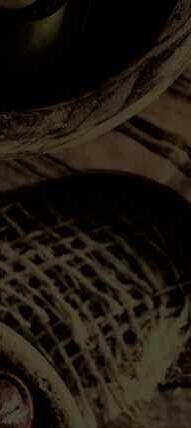

Family atmosphere and cozy environment. The authentic dishes prepared by our Greek chef use Greek ingredients and traditional recipes. Evenings with live Greek music.
This is AGORA, your Greek island in the heart of Prague.


AGORA - GREEK BISTRO & DELI MARKET Burzovní palác I Rybná 682/14, Praha 1 I 773 222 773
rezervace@greekagora.cz GREEKAGORA.CZ
I
ADVERTISEMENT




























 Text: Eva Volfová; Photo: Archive
Text: Eva Volfová; Photo: Archive









 INTERVIEW WITH H.E. MR. FENG BIAO, A MBASSADOR OF CHINA
Text: Martina Hošková and M. Zisso; Photo: Archive
INTERVIEW WITH H.E. MR. FENG BIAO, A MBASSADOR OF CHINA
Text: Martina Hošková and M. Zisso; Photo: Archive
















 Text: M. Zisso; Photo: Adriana Elena Bunea
Text: M. Zisso; Photo: Adriana Elena Bunea














 Text: Miroslav Bobek; Photo: Archive
EXPERT
Text: Miroslav Bobek; Photo: Archive
EXPERT









 INTERVIEW WITH H.E. MR. ABDULLA ABDULLATIF ABDULLA, AMBASSADOR OF THE KINGDOM OF BAHRAIN
INTERVIEW WITH H.E. MR. ABDULLA ABDULLATIF ABDULLA, AMBASSADOR OF THE KINGDOM OF BAHRAIN
 INTERVIEW WITH FILIP KŘESŤAN, PRODUCTION AND TECHNICAL DIRECTOR OF METROSTAV
INTERVIEW WITH FILIP KŘESŤAN, PRODUCTION AND TECHNICAL DIRECTOR OF METROSTAV








 INTERVIEW WITH H.E. MS. GUNT A PASTORE, AMBASSADOR OF LATVIA
INTERVIEW WITH H.E. MS. GUNT A PASTORE, AMBASSADOR OF LATVIA





 Mariachi Azteca de Praga and Dvorana dance group
NATIONAL DAY OF MEXICO
Mariachi Azteca de Praga and Dvorana dance group
NATIONAL DAY OF MEXICO




 Text: M. Zisso; Photo: Carlos Casasola
From left: Mr. Carlos Ruiz, Mrs. Valeria Gaona, H.E. Mrs. R. Leonora Rueda, Ambassador of Mexico, Mr. Martin Tlapa, Deputy Minister of the Ministry of Foreign Affairs of the Czech Republic, Mrs. Nuria Cazorla García
Mrs. Valeria Gaona and Mr. Carlos Ruiz
Mariachi Azteca de Praga
Text: M. Zisso; Photo: Carlos Casasola
From left: Mr. Carlos Ruiz, Mrs. Valeria Gaona, H.E. Mrs. R. Leonora Rueda, Ambassador of Mexico, Mr. Martin Tlapa, Deputy Minister of the Ministry of Foreign Affairs of the Czech Republic, Mrs. Nuria Cazorla García
Mrs. Valeria Gaona and Mr. Carlos Ruiz
Mariachi Azteca de Praga


 Text: Dmitri Babich; Photo: Archive
Text: Dmitri Babich; Photo: Archive

























































 Text: Ivo Nahálka; Photo: Archina Design Studio Prague
Text: Ivo Nahálka; Photo: Archina Design Studio Prague
















































